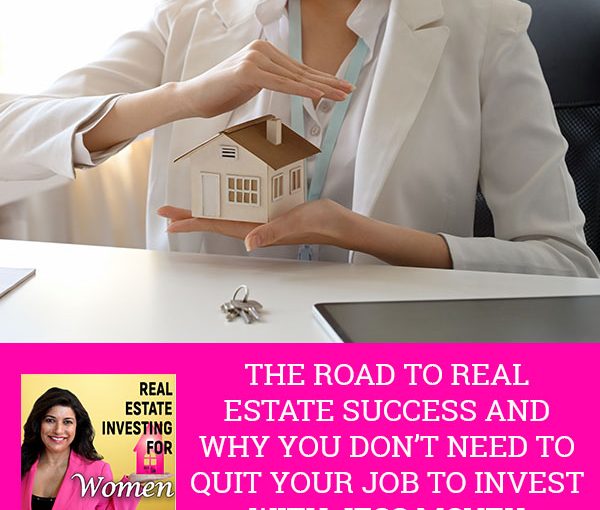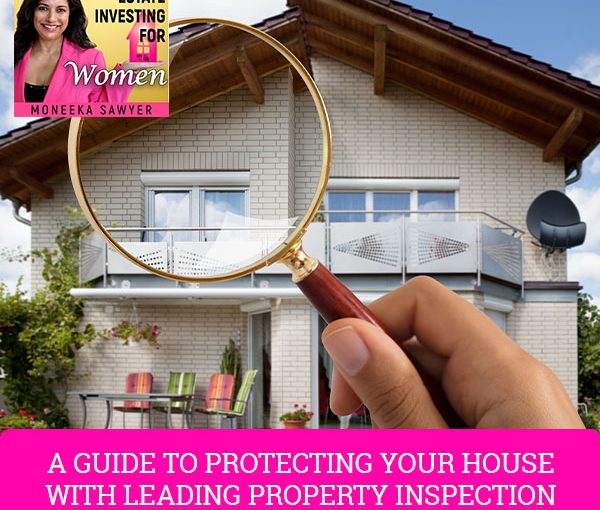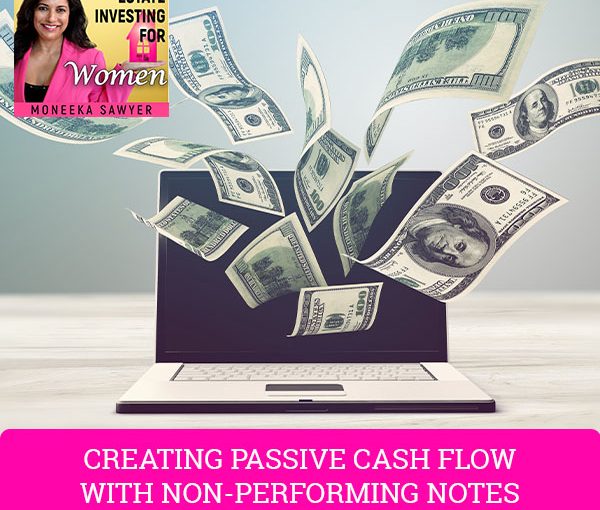REI Expert Panel Discussion: What You Need To Know About Real Estate Investing
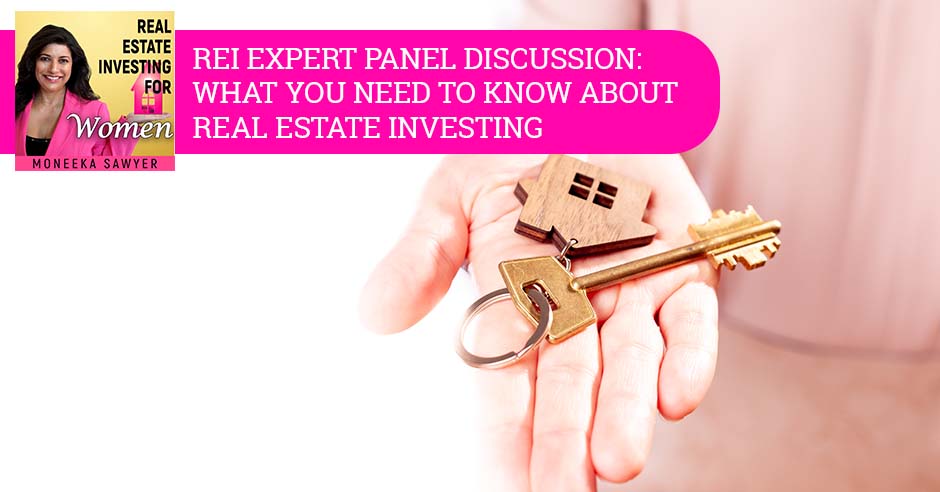
Have you always wanted to get into real estate investing but didn’t know where to start? Then this episode is for you. Today, Laura Powers hosts a real estate investing panel with some amazing experts, Henry Washington, Mike Denman, Patricia Berman, and Moneeka Sawyer. Having their fair share of success in real estate investing, the panelists break down barriers to entry in real estate investing. They make it simple and inspire people to know that no matter where you are, it is possible to get started with real estate investing. Enjoy!
—
Watch the episode here
Listen to the podcast here
REI Expert Panel Discussion: What You Need To Know About Real Estate Investing
Real Estate Investing for Women
I was on a real estate panel with some cool people and the conversation was fantastic. I wanted to share that with you. That’s what this episode is. I hope you enjoy it.
—
I’m so excited. I’m hosting this Intro to Real Estate Investing Panel with some amazing experts. I’m so excited to have all of our participants and experts here. A little bit about myself. My name is Laura. I’m a psychic medium. I do a lot of different things. I describe myself as a creative entrepreneur. As I started to make more money, I felt the need to learn more about money, how to invest property and how to be smart with money because I didn’t have that growing up in my family. It’s been something that I had to undertake on my own independently. If you don’t know how to handle your money and you get more, you will not accumulate more money, which is the desired goal for up for most people.
Even though I would not describe myself as a real estate investment expert, I’m a novice but I do know all these amazing people that are better at it than I am and that is farther along in their journey. In talking with all of these individuals, I realized they had so much amazing knowledge to share. In particular, focusing on new investors. There are lots of great tips and tools.
It can be somewhat intimidating to start investing in real estate when you’re a beginner, so part of my goal for this panel is to try to break it down, make it simple and inspire people to know that no matter where you are, it is possible to get started in real estate investing. That’s a little bit about me and why I wanted to host this panel. We’re going to introduce the experts one by one and then we’ll dive into some questions and answers.
First, I want to introduce Henry Washington. He’s an author, entrepreneur and real estate investor with more than 70 rental units and dozens of house flips under his belt. He built his rental portfolio in three and a half years. That’s so amazing. I was talking with Henry in my podcast and I said, “This is the length of a Bachelor’s degree if you think of the amount of time in your future for a degree.” That’s what he has done and has these incredible shifts. Henry is the newest co-host of The BiggerPockets Podcast and cast member of the BiggerPockets show On the Market. Thanks so much for being a guest, Henry.
I’m so happy to be here.
Is there anything you’d like to say before we introduce the other guests?
I’m happy to be here. This is super cool what you’re doing. I’m very passionate about real estate investing as a vehicle to build wealth. I love how you’ve mentioned that if you don’t learn how to handle your money, your money will handle you. Everybody wealthy owns the property. Even if you don’t use real estate to build your wealth, most people then put their wealth into real estate to grow it. I love that you’re trying to educate people on how to not only make money but how to continue to have that money grow. Kudos to you.

Real Estate Investing: Real estate investing is a vehicle to build wealth.
Thank you. That’s a huge goal of mine and with inflation being 9%, it’s more important now than ever. We met at this real estate investing track. I was struck by Henry’s story and how he didn’t have a lot of money saved up. I wanted to give people that background and that’s how we connected. It was inspiring to me because I want everyone to know that you can get involved in real estate even if you perceive that you don’t have capital. There’s always a way. I’m so pleased to have you.
Let’s go to Mike Denman. He is an award-winning filmmaker based out of Denver. He’s worked in marketing advertising for video games since 2011 and real estate since 2015. He’s been at the forefront of technological advancement and connecting people to content through internet apps like Instagram, Facebook, Pinterest, YouTube and many others.
He’s adapting his real estate advertising tactics to encourage higher amounts of traffic to short-term rental listings as possible due to his years of iterating the process. He’s been a real estate investor for years. We met through the film industry. I have learned that there are a lot of people that are in film and TV that use real estate investing to build a platform, which is amazing. Mike, go ahead.
Real estate is powerful. When we met, your podcast was first starting and you were seeing where all the trajectory went. You realized real estate was a thing that you wanted to get into. I, separately with Patricia, ended up going through the real estate investing side because she was like, “I want to get more into real estate.” It’s a natural progression but from two different angles.
Mike, I would love to hear if there’s anything else you’d like to share.
A fun thing about how we met is we met at the Women in Film & Media Colorado division. It was a female-led organization that still allowed male members. I was part of their marketing committee for a year or something like that. That’s when I met you and ultimately, all the trajectories that we’ve gone. It’s interesting because of your trajectory when we met, your podcasts blew up and all of these little pieces of the puzzle.
Having the real estate aspect be something that you found is like, “I’m going to put money into money-making things.” This is a surefire approach because everyone knows that you can increase your wealth with real estate. It makes sense that a lot of filmmakers and other people are like, “I have all these things but I don’t have a traditional 401(k).” Real estate becomes a cool add-on to it. It’s all super fun stuff.
I don’t think everyone knows. If you were in creative work, that’s often not as reliable as a regular paycheck because you tend to do a lot of freelancing or any other kind of freelancing work where you don’t have a regular paycheck, then something like this that can build wealth and have income that’s not tied to a paycheck is valuable as well. One of the stats I heard is that the average millionaire has eight or more sources of income. It’s also great for diversifying, even if real estate isn’t your main thing, what a powerful thing to be able to have at least one of your pockets of income.
Our next guest is Patricia Berman. She’s been a real estate investor since 2014. Patricia’s real estate journey began in 2014 with purchasing a primary residence and selling it two years later with a nice appreciation, repeating that process while holding the previous primary residences and running them out as long-term rentals. After a long stint investing solely in the Colorado market, she expanded to Iowa, Texas and California.
In 2022, Patricia took her love for hosting and service and dove into short-term rentals. She is successfully doling out hospitality by managing her two vacation properties with her partner, Mike Denman. Patricia is writing a book on leverage and she hopes to help other people find the courage they need to jump into real estate on their terms. Thanks for joining us, Patricia.
There are many ways to dip your toes into real estate, be successful, and get that stream of income happening for you, no matter what you do, no matter what your strengths are. Share on XThank you so much for having me. I’m so excited to be here and talk about real estate. I’ve spent a lot of time listening to BiggerPockets and realizing that there’s a style of real estate for everybody. There are so many ways that you can dip your toes into real estate, be successful and get that stream of income happening for you no matter what you do and what your strengths are.
I found what I love. We are invested in some long-term rentals but short-term rentals have souped up our portfolio. It’s not for everybody but I love it. The important message is to find what you love in real estate and do it on your terms. That’s what we’re doing. I want people out there to know that you can do this and it’s important to build wealth.
Another reason I wanted to host this panel specifically is that there are so many different ways to approach real estate. The more I got into it, the more I realized that you could flip, hold for long-term and do long-term rentals. You can do short-term rentals.
Also, house hack.
There are so many different ways like multifamily. It opens that door for people to see the different ways. In your case, you’re doing many of these different models. You’re not doing just one but based on your personality, one or more approaches might work for you. If you think it’s about flipping or short-term rentals to open your idea about the different ways that you can approach this, then find a real estate investing pattern and a method that works for you.
It doesn’t have to be one thing or another.
I’m going to introduce Moneeka Sawyer. She is the host of a talk-related podcast, Real Estate Investing For Women. Her expertise and joyous laugh have been featured all over the world in over 50 podcasts, on stages, on radio and TV stations, including ABC, CBS, Fox and The CW. Her multimillion-dollar real estate empire is only one example of her ability to strategize, organize and implement big business plans.
She is the bestselling author of the book, Choose Bliss: The Power and Practice of Joy and Contentment, which has built a multimillion-dollar business through real estate. Moneeka teaches others how to create a blissful and abundant lifestyle. She has traveled to over 55 countries and loves to teach others. I’d love to start with a question to the panelists. If you were starting from square one, what do you recommend? You’re like, “I’ve never invested in real estate. Where do I start? What do I do? What do I learn?”
It depends on age but house hacking is one of the best ways to start a real estate portfolio, especially in this market when you’re looking at something where interest rates are rising and there’s a little bit of uncertainty in the market. Use what you have. When you purchase as a primary residence, you’re going to have access to lower interest rates and reduce your overhead by either renting out extra rooms in your house. If you don’t want to share a space with other people, you can get up to a four-unit property and rent out the other units.

Real Estate Investing: House hacking is one of the best ways to start a real estate portfolio.
I am a big fan of house hacking. We even did it as a family where we had one extra room and rented it out to women who were single moms and stuff like that. We’ve vetted super well and it worked out well for us. We made a lot of lifelong friends that way. That’s one of the best ways to get started. There are many but that’s my go-to.
There are so many ways to go about it. One of the things that’s interesting to me is even when it’s a tough market for buying and selling as a whole, it’s still a good rental market. Keep that in mind that even if it’s harder to buy something, you might be able even more easily to rent it because people that would be buying aren’t buying. Either Mike or Henry, I would love to hear your responses too.
My response is the same as Patricia’s because that’s the trajectory we are going on. What do you think, Henry?
Getting started is super intimidating to people and it’s, even more, intimidating given the economic environment. People are concerned, “Am I buying at the top of the market? Am I paying more for the money for higher interest rates? Is there going to be a crash?” This war overseas is pushing prices of commodities up. People are like, “Is this the right time?” The answer is it’s always the right time. It’s a matter of what and how you buy.
When I’m talking to people about getting started with real estate investing, the majority of it is about your mindset around real estate investing. We’ve all mentioned it multiple times already in the short time we’ve been on the show. There are so many different ways to invest. A lot of those ways to invest are going to be more beneficial for one person versus another based on their financial situation.
To be able to tell you this is the best method for you is not easy to do without knowing what your financial situation is or what your super strengths are. What people should focus on is first making a decision, deciding you’re going to buy a property, even though you don’t know how or you don’t have the down payment. Maybe you think you don’t have the credit or you can’t find the property to buy. All these factors are going to come into play that we will tell ourselves is a reason we can’t do something.
Take all that off the table and say, “I am going to buy a property in the next 3, 6 or 12 months,” whatever that is for you. You have to make that decision in your mind and heart. Once you are solid on that decision, you’ll figure out a way. The show will reveal itself to you. Here are Laura, Patricia and Mike. You’ll know something that somebody says about a path that maybe makes sense for you. Patricia talked about house hacking. Maybe somebody who’s made the decision to start investing in real estate didn’t know about house hacking but now they know.
They’re going to go do some research and maybe that’s how they get in the game. When you’re starting, it’s more about deciding. “No matter what, I’m going to figure out how to do this and do it.” I promise, once you’ve truly made that decision and you keep immersing yourself in real estate investing culture, information and knowledge and surrounding yourself with people who are successful real estate investors, you will figure out a way to do it.
There’s a way to do it with no money, with some money, with other people’s money and when you buy deals on the market or off the market like house hacking. There are short-term and long-term rentals. One of these strategies will make sense for you. You only have to make a decision that you’re going to continue to educate and surround yourself with people who are doing it. Until that path reveals itself, you got to go down that path. That’s what I tell people who are getting started.
When you keep immersing yourself in real estate, investing culture, information, knowledge, and surrounding yourself with people who are successful real estate investors, you will figure out a way to do it. Share on XForgive me. I’m having a lot of problems too. The universe is saying something and I’m not sure what that is. I heard what Henry was saying and one of the things that I say on my show is goals without action are just dreams. Get out there, take action and create the life of your dreams. What everybody here is stating is first, Henry says you have to make a decision. Everything in our lives starts with a decision and a choice to follow that decision. Once you make that decision, action has to follow because otherwise, it’s only words in your head.
I loved what Henry was saying. I’m so sorry that I missed what Mike and Patricia said. It’s important that we make a goal and make a choice to take action towards that goal. That’s how we create the wealth and the blissful life that we want. I do want to go back and make a couple of comments about what Laura said. She said that most rich people have eight sources of income. Don’t misunderstand that by thinking that it was eight sources of income that you work. It’s not.
Most of those sources of income are passive and the things that rich people work at are the things that they’re passionate about. They’ll have one thing maybe that they are passionate about and they pour their heart into but these passive sources of income are what create the wealth. Henry also said that most wealthy people own real estate. That’s true. They may not have made their money there but that’s where they put their money later, which is what Laura is doing.
She’s modeling that for us, which is beautiful. You have to understand that 8 sources of income do not mean you need 8 jobs. Passive income is the key and real estate is the most stable way to get that passive income. The other thing that I want to say is there are 1 million ways to make $1 million in real estate. Choose one. As Patricia says, there are so many.
The action doesn’t need to look like you went out now and purchased a property. Listen to podcasts like your podcast, the BiggerPockets Podcast and to all of these successful people who have done it in different ways. When you hear one that makes you excited like, “That sounds great.” That’s what I did. Even after I had become a real estate investor, I listened to one with Zeona McIntyre and Avery Carl. I was like, “I’m going to get into short-term rentals.” You have to listen to your gut and heart but start consuming that information because that’s the only way.
That’s the only way that you’re ever going to learn what the opportunities are out there.
Maybe for some other people, it’s not listening to the podcast. Maybe it’s going to Meetups because those are another way.
Networking is a big deal. Thank you so much for mentioning that.
Our community of investors is so huge, welcoming and helpful that it’s like, “Get in where you fit in.”

Real Estate Investing: Goals without action are just dreams.
You have to understand that because someone else is successful does not mean that you have to do it their way. I love what Henry was talking about. He built all of this passive income in three and a half years. I retired myself in fifteen years because that’s the goal that I had and the choices that I made from my lifestyle. I traveled to 60 countries during that time. I have all these other things that I love to do.
Although I wanted passive income to retire, it didn’t need to happen in three and a half years. I had the time. As you’re looking at what is going to fit for you, understand that Moneeka or Patricia and Mike, Henry’s way or whatever Laura’s way turns out to be, I’m excited to hear, whatever our ways are, it’s opportunities for you to learn but it’s not necessarily going to reach your goals in your way. The way to stay blissful is to make sure that you understand yourself and create a strategy that supports your joy, as well as your wealth. You can have both. I hope that was what you were looking for, Laura.
The next question that I have is, what is your first real estate investing story? What got you into real estate? How did you get started? Let’s start with you, Henry, because one of the reasons to host this panel was to hear your story at Podfest.
I got started a few years ago out of desperation and panic. I had a panic attack because I was freaking out that my wife was going to figure out that I sucked at money and dollars and wasn’t going to be able to afford to provide her with the life that she deserved. I came to that conclusion because we got married fairly quickly. I met my wife and then we got married 365 days later. That was a quick physical transition but as far as mentally and financially, those things didn’t move as quickly as we did. It’s when we decided that we wanted to get married.
I had a wake-up call when we tried to buy a house together. We did all the things. I felt that I did all the things that society tells you to do. I got good grades. I went to school. I got a good degree and a job. I was doing software development and data analytics for Walmart. I was making a great income. We got married and went to buy a house. I’m like, “This is great. I make twice as much as she does. We’ll be able to afford this great house.”
The bank pretty much called me one day and said, “If you want your wife to be able to buy a house, you can’t be on the loan.” My credit was so bad. I made money but I didn’t have any money. There was $1,000 in my savings account. To a bank, I wasn’t bringing anything to the table other than the fact that I had a W-2. That was a big blow to my ego and to me as a person who wanted to provide for my new wife. I got punched in the gut as far as my ability to be able to do that. I had another wake-up call when we were having a conversation one night.
My wife bought that house and allowed me to live with her. Once we moved in, we did the other thing that married couples do, which is talk about your future, kids, dream houses, vacations and things. That’s supposed to be a fun conversation and it wasn’t. For me, I was terrified because I was like, “It’s a dream house but we barely got in this house. I don’t know how to dream house is going to go.” I knew I couldn’t afford it.
It was a starter home. It was a nice home but it was small. After that conversation, we went to bed and I woke up at 3:00 in the morning sweating and panicking because I knew she deserved things that I had no idea how to afford. I had $1,000 in my savings account. I had bad credit, so I did what anybody would do. I started googling, “How can I make some extra money?” That brought me to discovering terms like passive income.
I was like, “How can I make extra money without doing anything?” I started googling how to make passive income and that led me to articles on BiggerPockets and YouTube videos around people who invest in real estate. That was the first time I heard that real estate investing was something that normal people did. Up until that point, I assumed that super-rich people in big companies and things owned real estate and that’s the way it worked. It was an eye-opening moment for me to see that normal people with jobs, kids and families are owning property and they do it all the time across the country. It was mind-blowing to me.
Everything in our lives starts with a decision and a choice to follow that decision. Once you make that decision, action has to follow because otherwise, it's just words in your head. Share on XI ended up watching this TED Talk from this kid who was 27 years old and had 27 properties. The whole goal of the talk was he was financially free and he used rental properties to get there. I was like, “If this kid figured out how to buy twenty houses and be financially free, I could do it.” I went like, “I’ll do that.” With my bad credit and $1,000 in my savings account and being denied the loan for the house that I was living in at the time, I decided at 3:00 in the morning that I was going to buy real estate. That’s what I did. I woke up my wife and said, “We’re going to be real estate investors.” She was like, “Let’s do it.”
I didn’t know how to do it but I had made a decision. When you decide something, the suffix of the word decide is cide, like suicide. It means to kill off. There’s no other option but to do it when you make a decision. Once I did that, I was like, “I’ll go find people who do it and hang around them a lot until I figured out how to do it.” That’s when I discovered REIA meetings and real estate Meetups. If there was a meeting in my area, I got in the room every single week or month consistently. I wanted to learn and surround myself with people who were doing it so I could learn how to do it.
Between that, I was telling people that I was a real estate investor with only $1,000 and bad credit. I’m a believer that the universe gives you what you put out. If you don’t put out there that it’s what you are and that’s what you want, why is anybody else going to believe you? Why are the things that you’re looking for going to find you? They have no reason to. I was like, “I’ll tell people I’m an investor. Hopefully, that brings me the thing that I want.” That’s 100% how I found my first deal.
Somebody who heard that I was a real estate investor was a friend of mine. He was like, “I heard you’re buying property. I got to sell this house in 30 days. Can you buy it?” I was like, “I can buy it.” I had no clue how to buy it. I ended up putting that property under contract and found out how to do that because I googled how to buy a house without a real estate agent. It said, “Put it under contract.” I googled, “What’s a real estate contract?” I downloaded one, changed the names and we signed it. That’s a terrible idea and people shouldn’t do it but I did it. I was like, “I’m going to figure this out.”
I had to buy it and take it to a bank. The bank said they’d give me money as long as I had 15% of the down payment. They said, “Do you have it?” I was like, “For sure, I have it.” I didn’t have that either. I had to go to my group. That was the power of networking. You mentioned that networking is so powerful and I 100% agree. People don’t leverage networking enough. Everybody goes to 1 meeting or 2 and they network but that’s not networking. That’s only going to 1 meeting or 2.
Networking is consistently showing up and being around everyone who’s doing the things that you’re doing. It’s not only going to 1 meeting or 2. It’s committing to being consistently in those circles because the more consistent you are in those circles, the more people see you as an expert, the more the universe is going to send the right people in deals and things your way. I was so consistently in this group that I had this network of friends.
This investor group is so helpful. They want to see you succeed. People want to help you out. You hear wholesalers say, “Somebody is going to steal your deal.” It’s not like that in real estate. It’s more, so somebody is going to help you make money on your deal. Everybody’s so helpful. I went to my network and I was like, “I got this house. It’s a great deal. I don’t know how to buy it. How are you buying it?”
They talked me through how to go find the money. Somebody said he could leverage a 401(k) to buy it. I was like, “I will have to go find a 401(k).” My wife had the 401(k). I went to her and I was like, “Remember that time I said we’re going to buy a property? We need to borrow $20,000 from your 401(k) to buy this house.” She said, “Let’s do it.” We bought the house. The bank called after we bought it and said, “That house had a bunch of equity. We’ll give you a line of credit on the equity so you can go buy more deals.”
I went from a panic attack to owning a house 90 days later and the bank calling me and saying, “Here’s $20,000 to go do it again.” That is mind-blowing when you’re panicking about money 90 days before that. That’s my intro to real estate investing and what changed my life. Once I bought that first one and I saw how powerful it was, I said, “I’m going to buy as many as I can as fast as I can.” That’s how we got into it.

Real Estate Investing: Real estate is the most stable way to get that passive income.
It was such an inspiring story. That was a big motivation for me to host this particular panel. I love this because so much of this is about faith. It’s about making a decision that something’s going to happen, even if there is the perceived idea that you don’t have the resources or you don’t know how. Also, get in the room. Connect to the people that are doing it. Learn from them and get connected with a supportive network. I’d love to ask that same question to Moneeka. Can you share your intro story to how you got into real estate investing and what happened to you?
My intro story to real estate happened before I was born. It started with my parents. They had an arranged marriage in India, came to this country with $200 in their pocket and didn’t know each other very well. Suddenly, they’re starting a new life because things were bad in India. They wanted a better life for themselves and their family. One of the things my dad had heard was that the golden ticket to wealth in the United States was to buy real estate. They’re thinking about this. They want to buy a primary residence.
My mom’s a doctor and my dad’s an engineer. My mom is saving all of her nickels and dimes that she makes. She’s sewing little cushions for her sofa that she made. She’s making curtains. Imagine this doctor doing all these things and saving every nickel and dime so that they can buy real estate because that’s the dream. I was born 2 years later as their 1st child. Filled with that feeling of love, joy and hope for this new baby, they finally bought their first home. They bought their primary residence and then also an investment property soon after that.
They bought their primary residence when I was born. Three years later, they started their investing journey. It’s been my whole life. Fast forward fifteen years, they were able to pay for my college education and my wedding with real estate. They did the same for both of my sisters. My whole life, I had seen what real estate could do. I’d also seen my dad’s stress with tenants not paying rent, dealing with the different mortgages and juggling all the different phone calls from their tenants, the toilets and the termites. We hear about this stuff and this is what scares people away from it. I saw that.
I have to tell you, I had dug my heels in. I was like, “I do not want that life.” One of these things that I learned about real estate was it’s a long game. You want to be in there for a long time. If I was going to do a long game, I was not going to do something that was going to be miserable. I was clear on that. I decided, “No, thank you.” I graduated from college during a recession. I couldn’t find a job. I had a great degree from UC Berkeley.
I remember one day sitting with my dad and I’m like, “How am I going to do the adulting thing? What’s going to happen to me?” My dad said something to me that night that changed everything. He said, “Do you know, Moneeka? Everybody has stress, fear and money problems. Do you want poor people’s money problems or do you want rich people’s money problems?” My first thought was, “Do rich people have money problems?” They do but they are better problems.
My whole mindset changed. It was like, “I want this.” I got a low-paying job. I took whatever I could get. I swallowed my pride with a UC Berkeley degree. I did what my mom did. I started saving nickels and dimes so that I could buy my first piece of real estate. In the meantime, I fell in love. My sweet husband and I decided we wanted real estate. For our wedding, we asked everybody no gifts. We wanted a down payment for the house. Everybody gave us money.
We put together $10,000 and then went for an FHA loan. We’ve tried that but it didn’t work for us. We put down 5% on a $200,000 property. We were broke but we had this house. This is how we got it. In those days, we called house hacking getting a roommate. We got a roommate and that’s how we afforded our first house. We lived with this roommate for a few years. We got an equity line on the home once it had appreciated and then did it again. We rented this out.
That’s how we got started and the rest is history. My very first rental home was a nightmare. It was like my dad’s because that’s what I had learned. That’s what had been modeled for me. We sold that first property. My husband’s like, “You are so going to regret this,” and he was not wrong. We got rid of that property because I was like, “I can’t stand this headache,” but then with the next one, I realized what real estate could do for us.
Just because someone else is successful does not mean you have to do it their way. Share on XHenry, thank you for that decision idea. I made another decision that this was going to be the thing that I did but it was going to be happy for me. I was going to create my model. I was going to streamline my processes. I was going to create something that I could live with for the rest of my life, which is what I did. That’s how I began. For the first 4, 5 and 6 years, I would buy a primary residence because they’re the easiest to get into. They require the lowest down payment. The loans are easy to qualify for. You have to pay rent, so you might as well pay yourself.
I buy another primary residence and then rent that out. That’s how I got started until, eventually, I had enough equity in my homes that I could go shopping. It was like a monopoly. “I can go buy ten,” but it took a little time to get there and I had given myself the time. I wanted to do this in a way that felt good to me. That was my journey.
It’s important to focus on doing whatever you need to and get it going. It may not feel easy in the beginning. When you’re starting something new, there’s a certain amount of resistance you have to work through. That’s one hard part. The other thing is making decisions that may be in the short-term don’t feel the best but in the long-term are going to be beneficial. You have this pocket of money and put it into the house, so you don’t have that money anymore. That can feel not so great. You’re like, “I don’t have that $10,000,” or whatever it is that you put into a house or, “I’m getting a roommate.”
In the long-term, that’s going to be a good decision. Not to get too caught up in whatever’s happening at the moment. If it fits into your long-term vision for yourself, know that it can be worthwhile. It was on another podcast interview where you talked about how when the recession hit, the housing crashed. You made the tough decision to move out of your house and rent it so that you could keep it. That was not easy but in the long-term, it was a great decision for you.
There’s no clear path to wealth. One of my coaches said to me, “The person with the most flexibility wins.” The word pivot was used during the pandemic a lot. If you’re able to dance with what’s happening out there in the world and your life, you’re going to be able to create more of that wealth more easily. Many people that were in my situation lost everything. I lost several million dollars in six months in 2008 in 2009 but I made some different decisions than other people. I didn’t freak out, get scared or think the market was ever going to come back.
I decided, “This sucks. What am I going to do?” What I was going to do was hold my properties and figure out how to make it work. All of us have choices in every moment. Our knowledge, as Henry, Patricia, Mike and everybody’s talking about is to get educated. As you’re in those environments hearing the conversations and you’ve got that education, it makes it a lot easier to do that dance, pivot and change your strategy based on what’s going on. You’ve got a wealth of information that’ll help you to build your financial wealth.
That story made me want to give your mom a big hug. To come over here with $250 and she started saving her nickels to help buy that property, I want to hug that lady.
My parents are amazing. I’m so blessed.
Another thing to stress is it seems to me there is likely to be another recession here with inflation being so high. We’ll see how long and serious this goes but it still can be a good time for you. That doesn’t mean that it’s not a time to be in real estate or you’re going to lose everything. You have to be aware and make smart decisions based on what’s happening.

Real Estate Investing: If you can dance with what’s happening in the world and your life, you can create more of that wealth easily.
With that determination and will, you can still make it work even in this perceived challenging time. Most millionaires are made and billionaires too, often in times of economic downturn. What is challenging in some ways is a bigger opportunity in different ways. Much of this is about reframing as well.
Real estate is the best recession-resistant vehicle to invest in because rents go up as inflation goes up. There are other factors too. That’s oversimplifying it but real estate is the vehicle that can help us to weather that inflation storm, depending on how you invest.
We were talking before about how everybody needs a place to live. Maybe eventually it’ll be fully in VR and that won’t even be the case but at least for the perceived future, people need a place to live. People will always need that, whereas other things are negotiable. You need food and a place to live.
Real estate is a finite resource. A lot of people don’t realize that, especially in areas where growth has already happened and there are restrictions on open space and building. Considering the idea that it’s a finite resource, you got to get yours.
Where people can work from remotely anywhere, it’s opened up a lot more different real estate markets that people hadn’t necessarily considered living in before because they’re like, “It’s not accessible to my job.” These rural markets have amazing and affordable properties. Even when we went out to Iowa and we started doing our long-terms in Iowa, it was this scary first out-of-state thing. It was freaky but it works out because different areas have different regional economics. Ultimately, you can invest with lower amounts of money but still bring in some cashflow.
We cashflow beautifully on properties that we purchased for $125,000 each. People need places to live. They need nice, beautiful spaces. To build on what Henry and Moneeka said, it’s important in real estate. You want to sit with yourself and figure out what your strengths and weaknesses are. What do you want to do? What energizes you? The best way to be successful is to be authentically yourself. I try to tell people this all the time. Be authentically yourself. It’s a struggle for us. Every day, I’m wondering, “Maybe I should do this but that doesn’t suit me.” I’m trying to always center back on being authentically ourselves. When you are, you have more potential to get further.
I’ll comment on the whole flexibility thing. If you’re ultimately not a real estate investor and you think about being flexible, it’s that uncomfortability of having a roommate or those things where you wouldn’t necessarily normally do it. If you move out of your house for a little while, which we’ve all done, you move out of your primary into another primary, you get that primary going, the house is where you make a home at that moment and it’s a thing you’d build on, you get a little bit uncomfortable for some periods. You have to be okay with some of those levels of comfort. It’s like, “You can go a couple of years without having a walk-in closet that you love.” If you have a place that you are like, “This is going to be great to rent out,” spend a year there and then move on to the next property.
Wealth is built outside of your comfort zone.
One of the things I tell my tenants is, “You’re paying my mortgage. She can sit there paying your own.” I tell my tenants to leave me. I’m telling everybody, “Leave your landlord,” because you’re going to pay somebody’s mortgage. When the recession got tough, my husband lost his job and stuff like that, when we moved out of our dream home, where we built our whole life together. We finally bought our dream home and then we needed to rent it out.
The more consistent you're in networking, the more people see you as an expert, and the more the universe will send the right people and deals and things you're away. Share on XHe finally got a job and we moved into a dump. When I walked in there, it smelled like dog pee. Everything inside has been spray-painted gray. It was horrible. I walked in there and broke down crying but it was all we could afford and they will not pay rent. We had to buy it because that’s one of my policies. Don’t pay somebody else’s mortgage. Whatever we could do is what we did and it worked out beautifully in the end. That flexibility thing is so important. It can be your superpower to build that flexibility muscle.
This is good in life, not just real estate investing, if you can see the whole picture. We’re getting close to the end of the hour. Patricia and Mike, briefly, if you could share a brief version of your first real estate investment and then we’ll wrap up.
I’m originally from New York. I grew up in Brooklyn. This is a very rent culture city. Unless your parents had generational wealth and had a home that they owned already, you typically rented and don’t buy because it seems so daunting and scary. I moved out to Colorado in 2011. I purchased my first home ever in the beginning of 2012 for $305,000. Two years later, we sold it for $400,000. Even to purchase that house, I took a loan against my 401(k) to make that happen. I love paying myself back.
Henry said I didn’t know how I was going to fund the down payment. I thought I would take money out of the disbursement but I was researching and found out you can take a loan against your 401(k). You pay yourself back with interest and I was all about that life. I also learned that it doesn’t hit your debt-to-income ratio. That’s a small tidbit for people out there.
I was bit by the bug. I bought another place in 2014 for $245,000. I sold it 2 years later for $320,000. I was like, “I am getting into real estate.” I made that decision because this was working out. Why wouldn’t you get into real estate? This is crazy. The Colorado market had risen quite a bit and it continues to appreciate year over year for crazy numbers. That’s where it was.
I started by renting out a room. We then moved out and bought another place and rented that place out. We moved out of that one and rented that place out. That’s how we built our real estate portfolio and gained access to home equity lines of credit. That’s how our journey began. In 2021, we sold one of our most appreciating properties.
We jumped into the short-term rental market with a lot of appreciation that we had gained on one of the houses that we owned in Golden. Here we are and we’re doing well. We own two short-term rental properties plus our long-term. We plan on continuing this journey of purchasing long-term and maybe purchasing another luxury short-term rental.
I do advertising mostly for video games and real estate as well because I like it. When she started doing short-term rentals and came to me saying, “I’m not getting any bookings,” I was like, “It’s okay. I’ll run some ads.” She’s like, “Don’t tell me it’s okay.”
“What are you talking about? Do you know what the mortgage is?”

Real Estate Investing: Real estate is the best recession-resistant vehicle to invest in because rents go up as inflation goes up.
I’m like, “That’s all good.” I’ve been running advertising on Facebook, Instagram and different things like that for so long, especially for real estate. I was like, “This is going to be easy.” I started running ads for short-term rentals and it got easy. We were able to bring in massive amounts of people and increased our Law of Averages to get bookings.
I have this lever I can turn on and off and she feels like, “We’re getting views and bookings. I feel like it’s normal.” I’m like, “It’s cool.” I’ve been able to take that, create a system, help out a bunch of other short-term rental hosts and develop even advertising methodologies for them to follow us that way so they can find success on their own. I’ve pivoted my business a little bit to focus more on that in 2022.
I wrote a book, How to Excel at Short Term Rental: Advertising. I have a whole bunch of things happening in the real estate investing side of things, shifted and pivoted more of my day job focus and then I’m like, “I have more fun and a little bit more exciting times. I get to talk to all these cool real estate investors.” Instead of making the videos for real estate investors who are 20-year-old kids who learned how to wholesale at 18 and have 30 properties, which is amazing.
I was like, “I don’t know how to do that.” To Henry’s point, I was like, “You have to surround yourself with these people.” Ultimately, when you start talking to other investors and we find the different flavors of real estate, there are all these things that you can end up benefiting from by providing services for it.
I’m glad that you brought up short-term rentals because that’s a viable option. It’s a very different business model but I was talking with a friend here in Las Vegas who has three short-term rentals that bring in about $1 million a year. It can be real income. You have to know the rules and everything. In certain places, it’s allowed and not allowed. Do whatever you need to do to make sure that it’s legal but it can be a viable path to income.
There’s been a huge influx of investors who were rushing to short-term rentals but that’s where Mike comes in because if you’re treating it like a business, you should be advertising it. The more people who see your property is casting a wider net of people who are likely to book your property without waiting on the platform to get you invested.
There’s going to be a lot of cross-pollination within the panel itself. I’m excited for all of you to connect. I was like, “I can’t wait for you all to meet each other.” For anyone who’s reading, I love these panels. You and everyone can already see how amazing all of these individuals are. They have so much knowledge in different areas and backgrounds, which I love.
If you want to further your connection and learn more about real estate, I’m hosting an 11th-Month Real Estate Magical Mastermind. I’m calling it magical because I know that it will be. All these fabulous panelists are experts in the class. I’d love to have you. You can find out more about that on PowersHour.biz. You can look under the classes.
Feel free to reach out if you have any questions about it. It’s at [email protected] to contact me. I want to thank all of you so much for your time. I’m excited to see what happens, hear more about your journeys and learn more. Even though I’m posting this real estate class, I’m learning from all of you and I’m so grateful. Everyone’s going to learn from you as well. Any final closing thoughts that you have that you want to give out to people as we wrap up? I’ll start with Moneeka.
The best way to be successful is to be authentically yourself. Share on XI already gave you my closing. Goals without action are just dreams, so take action. I do have one other thing that I want to mention that is very relevant because we’re not all real estate investors. Remember that bliss is your birthright, so choose bliss every single day.
Henry, how about you?
I gave some mindset at the top of the show to talk about how to get started. I’ll give some tactical at the bottom of the show. Actual tactical things you can do to get started investing in real estate. You have to put the blinders on because it’s so flexible. There are so many ways to get started. It’s going to be overwhelming. There are so many options for you. Find the lowest common denominator among all the options and that is typically always going to be a good deal. It doesn’t matter how you’re going to monetize a property.
If you’re going to flip it, rent it, short-term rental, long-term rental, wholesale or wholetail it, all of these strategies require you to buy something at a discount that’s a good enough deal so that when you add value to it by fixing it up, putting tenants in it or furnishing it and renting it out, you can turn a profit. If the lowest common denominator is finding a good deal, then that’s where your focus should be. Don’t worry about all the other stuff like who’s going to finance it, who’s going to work on it, who’s the contractor going to be, who’s the title company or who’s the real estate agent. None of those things matter until you find a deal.
Find a deal. Figure out what a good deal looks like in the market. If you’re looking to buy real estate, you can do that simply by networking and asking people what they’re buying. Figure out how you’re going to find those good deals. You can google, “How do I find under-market value real estate deals?” You’ll get a ton of options. It’s direct mail, cold calls, on the market or off the market. There are all these strategies.
Pick the one that you think you can implement the easiest that you can apply the right amount of money and time to. Do it relentlessly consistently until you get a deal. Once you get a deal, you’ll be so motivated to go figure all that other stuff out that I’ve mentioned before because you’ll have that thing in your hand that you so worked hard for. People will line up to give you those resources because you’ve brought them something of substance. Take everything off the table, put your blinders on, figure out what a good deal looks like and be relentlessly consistent about finding one until you do.
Patricia and Mike, any closing thoughts for the two of you?
Be authentically yourself. Sit with yourself for a little while and figure out what your strengths and weaknesses are. What do you like to do as it relates to real estate? What do you think you want to do? What are you willing to try? Take action on those things. Learn more about how you can get involved. If you try something and you don’t like it, you don’t have to stick with it. There are so many different ways to get involved. Most importantly, start educating yourself about the different ways or what it is you want to do.
In the corporate world, Patricia, we call that a SWOT Analysis. You sit down and do your strengths, weaknesses, opportunities and threats. You write them all down. That is your point of attack.

Real Estate Investing: Bliss is your birthright. So, choose bliss every single day.
Also, make the decision. “I’m going to get involved in real estate.” That’s what you got to do. Don’t lose yourself in it.
One thing I’ll leave off with is even after you’ve dove into something, it’s okay to spaghetti test. Everything is a test. It’s not anything you have to commit to. I try a bunch of things at once. I see what sticks, resonates and reflects the value that we have. The reality of investing in the short-term and long-term where we hadn’t done that in 2022 is a freaky thing. Be like, “I know systems that work and the ways in which we can increase some of the viability of it.”
As you go into something, there are always ways that you can increase its effectiveness of it. You can get more investors to even add to it. It syndicates. There are all these things that you can do with other people’s money, like seller financing options. Finding those off-market deals and getting people to even be involved and you renting from the person who owns it. You are paying them their actual fee instead of a bank and you take over the actual deed later on. There is all this different stuff that takes conversation and trying it out. Explore and be unafraid to try new things.
Everyone, thanks for participating. I appreciate your time and energy. I’m excited about the mastermind.
Thank you for having us.
If you’d like more information about me, you can go to my website, PowersHour.biz. You can find me on Twitter @ThatLauraPowers, Instagram @LauraPowers44 and also on Facebook. Thanks for reading.
Important Links
- On the Market
- Women in Film & Media Colorado
- Real Estate Investing For Women
- Choose Bliss: The Power and Practice of Joy and Contentment
- How to Excel at Short Term Rental: Advertising
- PowersHour.biz
- [email protected]
- @ThatLauraPowers – Twitter
- @LauraPowers44 – Instagram
- Facebook – Powers Hour
——————————————————
To listen to the EXTRA portion of this show go to RealEstateInvestingForWomenExtra.com
Learn how to create a consistent income stream by only working 5 hours a month the Blissful Investor Way.
Grab my FREE guide at http://www.BlissfulInvestor.com
Moneeka Sawyer is often described as one of the most blissful people you will ever meet. She has been investing in Real Estate for over 20 years, so has been through all the different cycles of the market. Still, she has turned $10,000 into over $5,000,000, working only 5-10 hours per MONTH with very little stress.
While building her multi-million dollar business, she has traveled to over 55 countries, dances every single day, supports causes that are important to her, and spends lots of time with her husband of over 20 years.
She is the international best-selling author of the multiple award-winning books “Choose Bliss: The Power and Practice of Joy and Contentment” and “Real Estate Investing for Women: Expert Conversations to Increase Wealth and Happiness the Blissful Way.”
Moneeka has been featured on stages including Carnegie Hall and Nasdaq, radio, podcasts such as Achieve Your Goals with Hal Elrod, and TV stations including ABC, CBS, FOX, and the CW, impacting over 150 million people.
The Road To Real Estate Success And Why You Don’t Need To Quit Your Job To Invest With Jess McVey – Real Estate Women

The road to real estate success isn’t always smooth. When we fall on our knees, it can be hard to get back up again sometimes. But the results can be rewarding if we learn from these experiences. In this episode, Jess McVey shares the ups and downs of her real estate story. Jess started buying rentals when she was young. And then she made mistakes when the market crashed. Although Jess started to back up a bit, that was not to be the end of her journey. Now, she has reached the success she worked hard for. Tune in to this inspiring episode and see how she was able to find success as a real estate investor. Plus, learn why keeping your job while doing real estate makes sense and why it might be the perfect advice for you!
—
Watch the episode here
Listen to the podcast here
The Road To Real Estate Success And Why You Don’t Need To Quit Your Job To Invest With Jess McVey – Real Estate Women
Real Estate Investing For Women
I am excited to welcome to the show Jess McVey. She is from Northwest Indiana. She started by buying rentals when she was in her early twenties and started flipping shortly thereafter. She made some mistakes when the 2007 and 2008 markets crashed. She took a break for about seven years and started back up, flipping in 2015. She started a wholesaling business in 2021. She’s done a lot of stuff. Welcome to this show.
Thank you for having me.
I’m delighted to have you. I want to let you know how I know Jess. I hope you’re going to talk a little bit about this. She was a student of Zack Boothe. When I asked Zack about his successful ladies and the people that he feels proud of, he mentioned Jess. I’m excited to talk to her all about what her journey has been. I know I read your bio, but could you give us a high-level story? What happened?
It all started when I was in college. I was good at school. I never felt right. I was doing well at a job that I had besides going to school. I was looking for something that was going to allow me to retire early. I was already thinking about retirement at nineteen. I know those kids don’t do that. Yeah. You were the rare exception.
I started investing in the stock market in 2000. The tech market dropped and I did badly in the stocks. I started looking at real estate. I started liking what I was reading. I could see myself doing it. I had more control over the investments. I called my dad. I said, “Dad, I’m coming home from college.” He’s like, “Why?” I’m like, “I want to buy rentals. I want to be a landlord?” He’s like, “You don’t know anything about fixing anything?” I’m like, “Yes, but I’ll learn.”
I came home. He helped me move home. Several months later, I bought my first property. After that, I bought eight in several years. As I learned, I took care of all those properties. I’ve managed all of them. I’ve rented them out, did the repairs, hired people if I had to, and I also started flipping. I did a couple of flips. Fast forward from 2006 to 2007, it started getting bad in the real estate market. People started seeing signs that there was going to be a collapse, and it did. I did make some mistakes but reiterated. A lot of people did. I should have been that hard on myself.
It was way more experience investors than me that lost everything they ever worked for in real estate. I had been doing a couple of years in Boston rentals and a couple of flips, but it was hard on myself. I backed away from it. I kept my properties. I hired a property manager. I went to Chicago and lived. I was 28 at the time, still passive investing, taking care of my properties, but I always wanted to get back into it. I was hard on myself, but I never forgot what I wanted to do.
In 2015, I had an opportunity to flip a house. I did it. I was my uncle’s neighbor. My uncle told me about it. I approached them. They let me buy the property. That set me off, and I did 2 or 3 a year because I still had a small child, a daughter. I wanted to be a full-time mom. She went to school in 2021 full-time. That’s when I took it up a notch.
I was doing 2 to 3 properties, flipping a couple of rentals, 15, 16, 17, 18, and 19, but as of 21, when I added wholesaling marketing, I did twenty. 20 April of 2020 until 20 April 2022, twenty deals. From April until May 2022, I had 10, but I had to cancel 2. I got eight in the pipeline at some point. Either I own them, I’m getting ready to close, or I’ve already closed them. It’s for 2 or 3 months. It’s pretty good.
First of all, I love that you started young, and I know we all can’t turn back time, but it makes my heart sing when I hear about young people that are in it. They’re thinking about their future. If you’re young, if you’re in your twenties, see what happens.
Don't give up after making big mistakes. Share on X
Don’t give up if you make a mistake. If I would’ve kept going, I would have been retired now. I’ve seven years of experience in doing and making, but still, I’d probably have instead of 24 doors, I probably have 48 or 50 units, 48 properties, or however you want to cash flow, more rentals, but I took a break.
There are experienced investors that lost everything in the crash in 2007 and 2008. Yeah. It’s interesting to me that you, like me did not. You held onto your properties, took some time off, and let them ride. That was good to hear. Why do you think that worked for you? For me, I always say that I wasn’t over-leveraged. It’s because rents went up, and I had a financial cushion. I was able to ride that wave that way. That was hard on people. What was it for you?
Why it worked out okay is because I did buy them net traditionally, I put 20% down. Most people agree with this. Even if you see market drops and maybe flipping doesn’t pan out, usually the rental market isn’t quite as affected. That’s not to say the pandemic didn’t work best with people’s rents. It was a whole different animal. For the most part, we have market downturns or recession rents. Still, people have to be able to live in a place. I wasn’t affected too much with the rental market. They were rentals, and they were cash flowing, breaking even.
Another thing is, which I never had to do is I do have a good job. If I ever had to, I could have put money into my rentals. I never had to until this day. I bought somebody at once that I could have stomp pay for other ones. If I have a $3,000, $4,000 bill, something big, I got the other ones to pay for it. That helped me and a good rental market. With the area I am in, Indiana, it’s not that place to stay rented. There’s a demand for it. It’s safe. There aren’t a lot of turnovers. That’s the reason it helped me get past all that turmoil that happened in the first few years of the recession.
I heard you say that you’re an employee.
Back then, when I had money, I was in bartending, managing bars, and was a yoga teacher. 2015, 16, 17, 18, 19, the pandemic. I could have made that a lot easier by saying the pandemic ended my yoga career because I didn’t want to teach online. I didn’t want to teach outside of the studio. A pandemic happened, and that’s why I stopped teaching yoga. When I did it, it was $100 a week. I was doing my real estate and my rentals, bringing cash flow in. I’ve owned them for a while. Rent has gone up. I lived off that too.
Now my business is I work for myself for gem house buyers. Before I did have, I was a yoga teacher for several years, and a bartender before that would allow me to have the funds to buy the properties in a traditional way. I didn’t know anything about creative financing, wholesaling, or seller financing. I didn’t know any of those all real estate stuff that people learn. I didn’t know that back. I put 20% down on all the properties because I had a good job, and I was 22. What else did I have to do with the money?
Many people have this aspiration. When I quit my job, I’m going to start investing in real estate. The best way to start is when you’ve got a job, and there are many reasons for this. It adds in anything that you might want to add. First of all, yes, there are lots of awesome creative financing ways to go. If you have no way of getting cash, that’s great.
The easiest way to get into real estate is to have a job, qualify for traditional financing, put 3.5% half to 20% down, whatever you can come up with, and based on the program that you choose, buy a house, house hack or rent it out. Primary residences are the easiest to finance and get into, and you need to pay rent anyways. It might as well pay yourself rather than somebody else’s mortgage. Utilize that money to get into the next house. Keep your job so that you can do it again. Until you’re big enough, maybe 1, 2, or 3 properties. You’ve got enough equity in one property that you can fold it back out.

Real Estate Success: The rental market isn’t entirely as affected by market drops. When you have a market downturn or recession, people still have to live in a place.
Real estate does not have to be a full-time thing for me. I tell people all the time, “I work 5 to 10 hours a month on my real estate business. Now, it’s even less.” It’s not a full-time thing. Eventually, you can get to where you’re retiring. You’re working that little bit of time, whatever now most of your time is spent on what you would prefer to do. I love when you talk about, “I was working, and that’s how I got the money.” People forget that’s the easiest option out there. If things go wrong, you’ve still got your income. You’re still making money. I love that you modeled that. Thank you, Jess.
To add to that about you have a job, keep your job, and do real estate when you add that extra layer of, “I have to make money from this. I can’t survive.” You will not think properly. You won’t make a decision that is not as clean. You’re a little more desperate. Especially if you’re trying to learn real estate, you don’t even know about it.
I would hope nobody would be silly. I stopped. I’m doing what they’re doing, and they don’t know anything about real estate. Make sure you have that job, so you’re not working stressed out of that extra pressure of not succeeding. You have no job, and you’re surrendering trying to find a job. Nobody would be silly enough to stop unless they had a whole bunch of money. If you hit the lottery, I suppose you could quit your job but still do real estate.
If you win the lottery, make sure that you do real estate like that. Don’t spend them at. You invest it.
For most people, it’s cars, houses, and buying primary residences.
You’re like, “No, don’t do that.” I’m with you, shoes, purses, and clothes. Yes, you deserve all those blissful things and plan for the future. Your daughter went to school, and now you upgraded your business or up? What was the term you used?
I added another part of real estate investing. Although some people will say, “It’s not investing. It’s wholesaling.”
Talk about why you did that and how that transition happened?
I got tired of losing deals. That was why I started the wholesaling. I’ll back up and reiterate what that means. I was buying 2 to 3 properties in 2015. Maybe 2 or 3 in 2016. It’s easy to find those 2 or 3 properties. I bought some from some auctions and sheriff sales. I bought one from Auction.com and REOs. I’d got a couple of referrals.
Keep your job and do real estate. Stop doing what THEY'RE doing. Nobody would be silly enough to stop unless they had a whole bunch of money. Share on X
When I wanted to do more, my daughter was getting older, a little more independent, even a little bit before she went to school full time. I did 3 for 2 or 3 years. Now I want to do five. I was putting offers in and getting outbid all the time. Bigger companies probably have crews working for them, coming with their rehab costs lower than mine. It’s competitive.
I’m looking at wholesalers, emails, and MLS. For the last MLS in multiple listing services, I put an offer that was 53 offers. This was before it was hot. It was like 2018 or 19. I started thinking about wholesaling. I should back up. I did do two wholesale deals, one in 2017 and one in 2019. I have little marketing. I got the property. I was going to keep one as a rental. It occurred to me that I could wholesale it. It was great. I made $17,501 in one month. I didn’t know how to make it a business. I drove around a neighborhood, my neighborhood of rental properties. I was checking on them. I thought, “I’ll look around and see things for sale.” Low and behold, or was. I did that.
In 2019, I did send some letters out, mailers probably behind on their property taxes, and I got one from that. When you interview me, he is like, “Why didn’t you keep going?” I’m like, “I don’t know how to do it. I don’t know how to scale this.” In 2020, when I started watching YouTube, I found Zack. I liked him, and I signed up for his coaching. He filled the gaps in.
I got blessed because of several years of fixing rentals and learning how to flip. I know how to comp, do comparable properties, and do analysis to make sure it’s a deal. I was blessed that I knew that information. The wholesaling part was like, “This is how you find him. You call him. You send postcards. Do your marketing. He filled that in for me.” That’s how it all worked out for me. I hope that answers the question.
I want to add a couple of things. You say you were blessed because you already had this experience. You know how to mentally have an idea of what values are going to look like, what fix-ups are going to cost, and those sorts of things. Ladies, if you don’t have that experience, it doesn’t mean that you can’t do real estate. You have other blessings.
Let’s got to do a little bit more education first. It’s not hard to learn any of this. You don’t have to be a rocket scientist to learn how to go on Zillow and figure out what property sold in three months and how to decide. They look the same square footage. You’re not major calculations. You can learn the stuff in several months. It’s easy stuff.
When I started several years ago, there was none of this stuff. There are no Zillow, Trulia, and Redfin. We are lucky now that we have resources. I want to talk to you a little bit about Zack. You went through YouTube because this is a question that people ask me all the time. I want to find a mentor. I got on YouTube, and there are 50. You put in wholesaling and or whatever it is that you want to do, BRRRR, or whatever it is you want to do. A hundred people out there teaching about this strategy. How do I pick the mentor that’s got integrity, knows what he’s doing, and is going to help me build a successful business? How did you pick Zack?
I didn’t interview too many. I can tell you how I met Zack or how I decided to watch him on YouTube. There’s an app called DealMachine. It helps you add properties if you want to drive for dollars. He was on a podcast like an interview, and I liked him. I’ve checked him out on YouTube. I saw he had a video that said $40,000 in 40 days.
He did this challenge, and I watched all these. I liked him. He’s genuine. He’s not a big host. He’s doing well. When you look at his videos, he’s not huge. He’s not getting 1 million views. He’s small-time still. He’s going to be because he is genuine and authentic. I connected with him. I reached out to him, and we talked on the phone. It was affordable. He’s not overpriced on his coaching, at least at the level I picked. You might have something more maybe, but what he offered me, I was like, “That’s a great deal. Add to me.” I signed up for him, but he’s this easy-going, accessible guy. There’s something about how you connect with people.

Real Estate Success: Having a job qualified for traditional financing is the easiest way to get into real estate.
His real intention is to help people. That’s part of why I have you on. I’ve had several people on from his group because I feel that from him. I feel his heart. In every conversation that I’ve had with him, I feel deeply that his intention is to help. What is it that you loved most about working with him?
I still work with him. I texted him because I had a question about a property I had on a contract with a seller. It’s the first seller ever tried to walk out from a contract on me, all these deals I’ve done. The first ones that said, “I changed my mind.” I didn’t know how to handle that. I called Zack. He knows so much. If he doesn’t know it, if it’s technical, he’ll might say, “Miguel, one of his team members, knows.”
He knows a solution that I don’t think of. He’s always got all these different situations. He knows how to properly answer them for me. That’s why I like him. That’s why I keep reaching out to him if I need them. Sometimes I think I know more than I know. Sometimes I’m like, “I should probably have.” I have the ability to reach out to him more if I want. I don’t think to ask for help. I try to figure stuff out on my own, which sometimes isn’t the best. In this case, I knew I wasn’t figuring it out. I needed some assistance. He’s experienced. He’s done so many deals. That’s why I like him.
Is he super responsive?
We have group coaching calls, but if you have a deal on the line and you don’t know, he will call you back. He will make himself accessible to you. When it comes to actual questions about the course or a deal in the works, he’ll probably wait until the weekly coaching call. You can ask whatever questions you want. It’s 1 to 2 hours long. Sometimes, it’s been longer than two and a half hours. He will keep going until everyone answers. For the specific deals where you have something right there at the moment, he’ll make himself accessible.
That’s so rare, don’t you think?
Yes, I think so. Some coaches might be more expensive and not be as available
I have not taken Zack’s course because I’m not interested in wholesaling. I’m in retirement mode. I’m having fun. It’s important to me as we talk about him and I share about his coursework with my ladies that we’ve got some truthful, honest perspectives on what he has to offer. He’s a wholesaler. He loves it, and he loves teaching it from what I understand, but everybody I’ve spoken to. I’m glad to hear that. Tell me, Jess, what advice would you give to a new investor?
I would say the first is to get a mentor. I do believe you should have a coach. You could ask questions too. Yes, YouTube and books are great, but there’s a saying I have, “You don’t know what you don’t know.” How do you know what to learn first? If it’s basic real estate, you could find a mentor for that. If there is something specific, you want to learn, whether it’s wholesaling or you wanna be a real estate rental landlord. You want to have a huge portfolio. There’s a mentor for that.
Real estate does not have to be a full-time thing. Share on X
There’s a lot of free besides having a coach. BiggerPockets is good. There’s a lot of education on basic stuff but get an education. There’s another saying, “You’re going to get an education in real estate, whether you like it or not. You do it by making mistakes that are costly, or you do the education up front to help mitigate those mistakes.”Another piece of advice is if you do make a mistake, don’t give up. It works. Nobody’s successful. All the people that are successful that we know about in history usually made many mistakes and failures before they hit it. It sometimes takes years for that because you got to be patient.
Everything that you say, I agree with. Success can’t happen without failure. The only way to reach goals is to push yourself out of your comfort zone and what you already know. Otherwise, you stay stagnant in what you are and what you’re doing. When you’re pushing, you’re going to fail. When you were a baby and learning to walk, you didn’t go get up on your feet and start walking. Maybe some of you did, but most of us didn’t. You had to fall down a couple of times. Sometimes it hurt. You start crying.
We’re that same way. Every time we start something new, we have a new ambition or a new set of goals. We’re that same person. We’re not going to be, “I’m up.” You’ve got to learn. You’ve got to when you’re a baby. You’ve got mom standing there saying, “Come on.” Dad molded you on the other side or whatever. Those are your mentors in those days. That’s what you need, even in your businesses.
There are so many things, setting goals and making yourself accountable. I take videos. If people check me out, they’ll see. My video is on my personal page. I plan to put them on my business page, my Instagram. I’ll do videos. They’re live. There’s no script, or I’m going at it. I do that because it makes me accountable because I know people are watching. I’m like, “I got to make sure I do another one.”
That’s my way. That’s a little more high level. People reading could put something out there to people telling what they’re doing. They’re making themselves accountable. People ask them, “How’s it going?” You’re like, “Okay.” You won’t forget. People are reminding you, or you’re posting something on Facebook, and that’s what can be encouraging too. People will like it. This is a little social interaction to help encourage people to be accountable.
Normally, when I talk about accountability, I talk about it with group coaching or whatever. This was such a different perspective on accountability. I love that, Jess.
Thank you. Those videos are my accountability for myself.
Jess. You’ve been amazing. Thank you so much. Tell everybody how they can get in touch with you. I want to hear about your Facebook page, Instagram, and all that stuff. Let people know how they can reach you.
For my business page, Facebook and Instagram. You can reach out to me through my company or me. We’re both on as my personal, and that’s my name, Jesseme McVey. My actual business is Jemm House Buyers. Me, my daughter, and my husband’s initials. It’s also because I look for gems.

Real Estate Success: Ladies, if you don’t have experience, it doesn’t mean you can’t do real estate. You don’t have to be a rocket scientist to do it.
Ladies, you know that Jess is a student and friend of Zack Boothe, who we’ve heard from before. If you’re excited about learning what she learned from him, you can still connect with him and his team. Go to BlissfulInvestor.com/Zack. You’ll get to talk to him or Stephanie, who you’ve already met. They do have someone else who’s going to be working on the phones. I trust that that person will be as fabulous as them. You can go to that link and set up a time to chat with them and see if this business is a good fit for you. We saw what an amazing fit it’s been for Jess. If you’re interested in connecting with them, remember to go do that.
The show notes on the podcast players are, tend to be shorter and don’t always include the links. Go to BlissfulInvestor.com so that you can see the blog posts. That way, you can see all the links, all the gifts, all the connections, everything there for all my show. You can even do is search. My team will have Jess’s contact information and all the links. Do you have anything you want to close with Jess?
I think we did a pretty good job. We covered a lot. If you’re new to real estate investing, don’t give up. I always loved it. Whether you want to supplement your income, or if you want to do a full time, it could be very financially rewarding, and it gives you other rewards as well because you people work for yourself you can spend more time with your family, and you don’t have a boss and all that. Maybe you want it because you want to plan for your future.
To me, it’s the best investment of your time and money out there. They say 1% of the wealthiest people in the world, 90% of them own real estate of the 1% of the world the population. Ut’s a great vehicle to build wealth. Even passive or active investing wholesaling cash in your pocket when you do the deals, regardless of whatever you’re looking for. It’s awesome.
I always say, “There are a million ways to make $1 million in real estate.” You have to pick the strategy that fits best with what it is you’re trying to achieve.
Whatever you pick, if you’re diligent, you will be successful at it. You’ll make money at it. You’ll achieve your goals, whatever you decide to choose to do.
Thank you so much for sharing all this amazing wisdom with us.
No problem, anytime. Thank you for letting me share my story and give some advice to other investors out there. I appreciate it.
Thank you. It’s my pleasure. Ladies, thank you so much for joining Jess and I for this show. You know how much I appreciate you, and I look forward to seeing you next time. Until then, remember, “Goals without action are dreams.” Get out there, take action and create the life your heart deeply desires. I’ll see you soon.
Important Links
- Jess McVey
- Zack Boothe
- Auction.com
- YouTube – Zack Boothe
- DealMachine
- $40,000 in 40 days
- BiggerPockets
- Facebook – Jess McVey
- Instagram – Jess McVey
About Jess McVey
 We are professional home buyers, and we are proud to say that we’ve already helped many homeowners sell their homes! For us, the seller always comes first, and that means the deal has to work for both of us. Integrity and education are our principals, and they are the reason why we have the reputation we have today, as one of the most respected homebuyers around the area. We give you full support, and there are no gimmicks or hassling.
We are professional home buyers, and we are proud to say that we’ve already helped many homeowners sell their homes! For us, the seller always comes first, and that means the deal has to work for both of us. Integrity and education are our principals, and they are the reason why we have the reputation we have today, as one of the most respected homebuyers around the area. We give you full support, and there are no gimmicks or hassling.
We always work with fair offers and great prices, no matter the condition the homeowners are in!
NO financing is required because we have cash in hand to make the close even FASTER! We can close it all in just a week, but you can choose the actual closing date. We work on your terms!
——————————————————
To listen to the EXTRA portion of this show go to RealEstateInvestingForWomenExtra.com
Learn how to create a consistent income stream by only working 5 hours a month the Blissful Investor Way.
Grab my FREE guide at http://www.BlissfulInvestor.com
Moneeka Sawyer is often described as one of the most blissful people you will ever meet. She has been investing in Real Estate for over 20 years, so has been through all the different cycles of the market. Still, she has turned $10,000 into over $5,000,000, working only 5-10 hours per MONTH with very little stress.
While building her multi-million dollar business, she has traveled to over 55 countries, dances every single day, supports causes that are important to her, and spends lots of time with her husband of over 20 years.
She is the international best-selling author of the multiple award-winning books “Choose Bliss: The Power and Practice of Joy and Contentment” and “Real Estate Investing for Women: Expert Conversations to Increase Wealth and Happiness the Blissful Way.”
Moneeka has been featured on stages including Carnegie Hall and Nasdaq, radio, podcasts such as Achieve Your Goals with Hal Elrod, and TV stations including ABC, CBS, FOX, and the CW, impacting over 150 million people.
A Guide To Protecting Your House With Leading Property Inspection Expert John Cipres – Real Estate For Women

Property inspection is such a routine procedure that we often take it for granted. But no self-respecting homeowner, investor, buyer or broker would deny its importance in all real estate transactions. Just how important is property inspection and what does it entail? Today’s guest gives us the details. John Cipres is a certified property inspector, licensed general contractor, and C-36 license holder. He is a leading expert in his field and his clients have included real estate brokers, investors, homeowners and commercial companies. In this episode, John explains the major components of property inspection and why each of these components is essential. Join in and learn what things you should notice and when you should run as fast as you can!
—
Watch the episode here
Listen to the podcast here
A Guide To Protecting Your House With Leading Property Inspection Expert John Cipres – Real Estate For Women
Real Estate Investing For Women
I am so excited to introduce you to our guest, John Cipres. John worked for over sixteen years as a Field Customer Service Technician for Sempra Energy Gas Company. He left in 1997 to pursue his dream of owning and operating a business of his own. John is a certified property inspector and a licensed General B contractor. He holds a C-36 plumbing license. He is a leading expert in his field.
His clients include real estate brokers, investors, property management companies, homeowners as well as commercial companies i.e., Amtrak, LA Sports Arena, JPL, US Tile, and CP Kelco to name a few. John is also a certified life and business coach. He enjoys traveling in his spare time together with his wife, Laura, mentoring at-risk youth, and coaching young entrepreneurs.
—
Welcome to the show.
Thank you so much for having me.
This is so much fun. This is the first time I’ve done something live. I’m excited about this.
We’re going to have some fun.
First of all, tell us what are the major components of the property inspection.
There are five major components on any property. There’s a roof, foundation, electrical, plumbing, and heat and air conditioning. Those are the five major safeties. Run for the money if it’s not adequate for the house.
Those are the things people need to make sure that they get inspected. That’s why they hire you.
The other stuff is cosmetic things. Those are the major components of a house.
As a new home buyer, it’s very important to hire a home inspector because they would know what they’re looking at. Share on XTell us what are the fire, health, safety, and water hazards that exist on a property.
Smoke detectors are important. Carbon monoxide is important and stuff like that. If their heater is malfunctioning, it would be spewing carbon monoxide if it has a crack or stuff like that.
This whole carbon monoxide thing with the detectors is a new thing in the industry. We started requiring this a few years ago. All of us have heard about carbon monoxide. Tell us why they started doing this where you have to have a detector and what it causes for people in their homes.
The reason why they started having it is that there have been deaths equated to gas and unburned fumes on the property. It picks up carbon monoxide, which is odorless and tasteless. It’s a killer. After all these years, they have figured, “Let’s make it the law.” It saves lives. That’s the reason that they have it and had passed a law. System-wide, they have one in each property. The way the law is written is there’s one per floor. In other words, if you have two floors, you need one per floor.
Before we started, you mentioned something about the deep dive. You walk into a house, notice certain things, and run as fast as you can. Could you tell us a little bit more about that with regard to carbon monoxide?
Usually, the seller is required to put it on. If they don’t want to do it, then make sure they put it in because it is a requirement by law to have it on the property before you close escrow. If they don’t want to do it, then somebody has to do it. A lot of times, the agents will put it up. That’s one important thing because it does save lives.
What would you consider a minor or a major repair when you’re doing inspections?
A major repair would be an outdated electrical panel. If it’s way outdated, they would need to have a new panel, which includes the wiring. There’s some old wiring out there if they’re not grounded outlets and stuff like that. It’s a major expense to rewire a house and put a panel on. That’s something that the buyer should be aware of if they’re going to buy a property. They need to budget that money.

Property Inspection: There are five major components of property inspection: the roof, the foundation, electrical, plumbing, and air conditioning. These are the five major safety or run-for-the-money components.
How would they know?
They would call a home inspector like myself to come out and inspect all the major components of the property. We write up a report and get our reports out within 48 hours or sooner. Based on that report, since we’re a licensed contracting firm, if we’re asked, we will put a cost analysis on that report. That way, they know what it costs. They can do one of two things with that. They can ask them to repair it or they can get a credit for their escrow.
If I were walking into a home, how would I know if that’s something to keep my eyes on and think about?
If you go to the panel and you see that it’s old and it’s an original part of the house, it’s a red flag. Your inspector would catch that and then follow. There are some recalled panels out there. He would know if they’re recalled or not and then let you know, “This is way outdated. It should have been replaced many years ago. It’s new.” He would let them know right away. That would give peace of mind for him.
What is the average lifespan of water heaters and tankless water heaters? Talk a little bit about that because that’s a big issue.
The conventional water heaters on the property are usually 40 or 50 gallons. Their normal lifespan is between 8 to 12 years depending on how hard the water is in the area and if they flush it out once a year. That’s on conventional tank water heaters. It’s important to keep track of that. If a water heater is located upstairs in the hallway and they don’t catch it in time, then you have a big water damage issue when they go. We let them know by the rating plate how old the water heater is. If it’s at the end of its lifespan, we would let them know. We have run into water heaters that are 18 to 20 years old in the middle of the house. It’s a big urgency to get that replaced.
As a new buyer, is there any way for me to detect that walking into a house?
You would have to know what you’re looking at. That’s why it’s important to hire a property home inspector because they know what they’re looking at. They will say and write on the report the age of the water heater if it’s new and the risk factor if it’s low, medium, or high for leakage. They will put it on the report.
Team up with a contractor, property inspector, or somebody that you can go with and look at properties together. They can guide you and tell you if something’s a good deal. Share on XIs a seller responsible for that?
It’s all negotiated. It’s a real estate question. If the buyer says, “I would like the water heater replaced to help close a deal,” then it’s up to the seller to do that. The seller could say, “I’ll give you credit for that.” You can do it yourself.
We’re going to talk a little bit more about deep dives in the EXTRA portion of the show. Before that, why don’t you let my audience know how they can reach you?
They can reach me by going to our website. It’s www.AndreasFaultPro.com.
What stuff do you cover in the newsletter? What would they be getting from that?
There’s a lot of safety stuff. I’m known as the property inspector that saves lives. It would have a lot to do with safety on their property. A lot of homeowners are first-time homebuyers. They don’t know anything about a house. They can get educated along the way from the newsletter. Once a month, we will have some new information on there. They can look at it. It would be very beneficial.
That’s so valuable. I’m spending so much time maintaining. I can’t keep up with what’s going on. We don’t know where to look. If you’re sharing that information, that is valuable. I love that you said that you’re the home inspector that saves lives. Are you ready for our three rapid-fire questions? The first one is this. Give us one super tip on getting started in real estate investing.
From my perspective, one super tip is to team up with a contractor, a property inspector, or somebody that you can team up with and look at properties together. It would be a good tip because it’s like having that education on the house that they would normally have as an investor. That would be a good tip to include somebody, hire somebody, or team up with somebody who has some experience on properties. That way, they can guide them and say, “Is this a good deal? How much money are you going to spend on repairs?” We know that it’s all about the bottom line.

Property Inspection: A lot of homeowners are first time home buyers and they don’t know anything about a house, so they can get educated along the way from the newsletter.
That way, when you start walking in a house, you’ve already got that education. You can start eyeballing things and noticing things that you wouldn’t normally notice. Give us one strategy for being successful in real estate investing.
One strategy that I see is getting up early in the morning and making the best of your day 3 or 4 hours before people get up. Do your homework and don’t let the every day phone calls bother you when you can get so much done before your start time. Everybody starts usually at 7:00 or 8:00. I get up at 4:00 or 4:30 in the morning. I get stuff done when people are sleeping. When investing, that can be tied to doing your homework on the multiple listings or going out there. It’s first-come, first-served on properties. Whoever finds the deal first can put the offer in first. The early bird catches the worm.
It’s so funny because I don’t even get out of bed until 8:00 but I do that on the back end. Often, I’m working from 12:00 to 2:00. I still get my 6, 7, or 8 hours of sleep but I’m working in those quiet hours in the evening. It’s finding some time when you’re not going to be disturbed so you can focus. What is one daily practice that you would say contributes to your personal success?
Get up after you get hit. When you fall, get up. Keep on going after your dream and don’t let any negative talk or negative situation take you down. I always say, “Out of every negative situation, if you can find one good thing in that, that’s the golden nugget.”
We’re going to talk on EXTRA more about safety tips that John has to offer us. He has some stories for us. I love that he calls himself the home inspector that saves lives. We’re going to talk more about that in EXTRA but for now, we’re going to sign off. Thank you so much for joining us for this portion of the show. If you are subscribed to EXTRA, please stay tuned.
If you’re not but would like to be, go to RealEstateInvestingForWomenEXTRA.com. You can get signed up there. If you’re leaving us now, thank you so much for joining John and me for this portion of the show. I look forward to seeing you next time. Until then, remember that goals without action are dreams. Get out there, take action, and create the life your heart deeply desires. I’ll see you next time.
Important Links
——————————————————
To listen to the EXTRA portion of this show go to RealEstateInvestingForWomenExtra.com
Learn how to create a consistent income stream by only working 5 hours a month the Blissful Investor Way.
Grab my FREE guide at http://www.BlissfulInvestor.com
Moneeka Sawyer is often described as one of the most blissful people you will ever meet. She has been investing in Real Estate for over 20 years, so has been through all the different cycles of the market. Still, she has turned $10,000 into over $5,000,000, working only 5-10 hours per MONTH with very little stress.
While building her multi-million dollar business, she has traveled to over 55 countries, dances every single day, supports causes that are important to her, and spends lots of time with her husband of over 20 years.
She is the international best-selling author of the multiple award-winning books “Choose Bliss: The Power and Practice of Joy and Contentment” and “Real Estate Investing for Women: Expert Conversations to Increase Wealth and Happiness the Blissful Way.”
Moneeka has been featured on stages including Carnegie Hall and Nasdaq, radio, podcasts such as Achieve Your Goals with Hal Elrod, and TV stations including ABC, CBS, FOX, and the CW, impacting over 150 million people.
The Benefits Of Building Virtual Teams For Your Business Needs With Miquella Gaunt
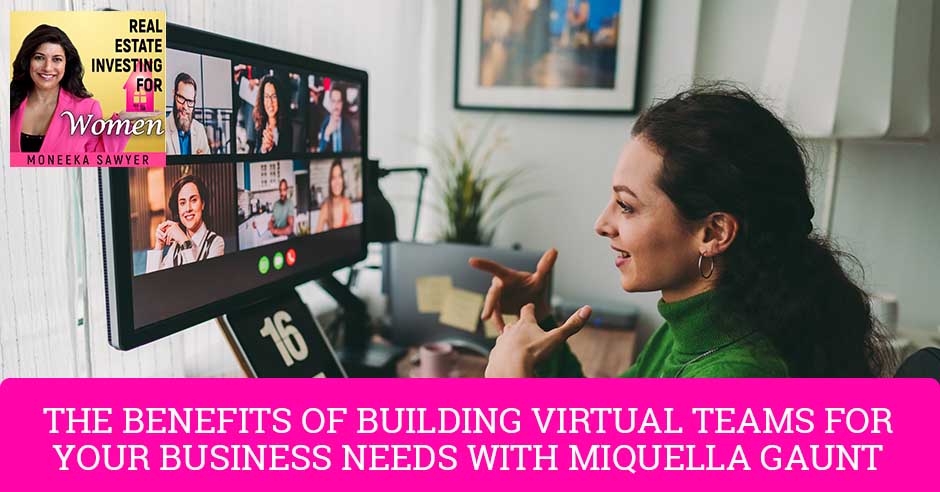
Technology has shown us so much of what is possible in the workplace. Pushed by the pandemic, more and more businesses and organizations are opting for hybrid work. Thus, we have virtual teams. And while a virtual team has multiple purposes, it always has a specific goal in mind. In this episode, Moneeka Sawyer interviews Miquella Gaunt of Backdraft Home Solutions about how they transitioned to virtual teams and how they are building them to help support their specific needs. She takes us across their hiring process and marketing avenues, then shares how they’ve adapted through COVID to now as we’re coming out to the other side of it. Plus, Miquella talks about the onboarding system she uses that helps her become the successful real estate investor she is now.
—
Watch the episode here
Listen to the podcast here
The Benefits Of Building Virtual Teams For Your Business Needs With Miquella Gaunt
Real Estate Investing For Women
In this episode, I am so excited to welcome Miquella Gaunt. This is what she says about herself. You ladies know that I read bios. Normally, I try to change it to the third person, but this bio is so sweet the way she wrote it, so I’m just going to read what she wrote. What she says is, “My new husband and I started this home buying solutions business to add value to families and the local community. We know what hard times are and we want to be a good option for people experiencing them, especially when the typical home selling process is complicated and lengthy.
We have created an amazing experience of relief for many families that we have worked with while connecting with them on a personal level. We have always thought with a positive mindset to impact our local community and calm people during times of stress and chaos. We are ready to stand by their side to accomplish their current goals, simplify their problems and make them suddenly organized, easy, and convenient so people can move on to a stress-free life they didn’t even know was possible.” Miquella, welcome to the show.
Thanks for having me.
We have a lot of people that talk about, “I do this business to help people.” Most of them mean it. You can tell a difference in people in how deep that goes in their heart. Some of it is they’ve been doing it so long so they’re like, “This is how I run my business,” and it’s not quite as connected to that anymore. They’re still out there doing those things, believing it, and feeling it, but it’s not quite as deep and connected to their heart as it might’ve been in the beginning when they started their businesses. I love the way that it came from your heart. I know that you’re young in this business and that energy is so inspiring. Thank you for that. Could you tell us high-level your story?
I wasn’t always in the real estate business. A lot of people always come and say, “My parents were in it and I was ingrained in it,” but I wasn’t. I came from a marketing side. My mom had a very successful marketing and advertising agency. I worked with her since I was thirteen making collection calls. She’s like, “You’re not busy for the summer. Come work.” Even as I got older, I was more on the project management side. I was running the orders or anything like that, but I got to see firsthand how my mom handled marketing for other businesses which helped in doing what we’re doing now.
After that, I went to work for another company that was in promotional retail merchandise. I was a project manager and operations. I was handling everything on the backend. That’s where I strive and am good at that. I met my now-husband. Talk about a visionary. If anybody has ever read the book, Rocket Fuel, it talks about the visionary and integrator. He is a visionary and I’m 100% the integrator.
You complement each other perfectly.
He comes to me sometimes with these ideas and I’m like, “What?” He’s got a big idea and I come in with how to implement it. He does as well, but it works. He originally started this business. He was a firefighter. Long story short in a custody battle for his baby girl and it was how do we make a lot of money to be able to afford attorney fees? Those things in family court rack up quickly. Both of us have read Rich Dad Poor Dad. He knew that real estate was where he want to go. I was already actively working on getting my license because I knew I wanted to end up in the real estate.
He started the wholesaling business. I ended up leaving my job to help him with his daughter. He ended up getting primary custody of her. I got to help raise a little baby girl. I decided that the retail side wasn’t for me. I liked the investing side better. I liked getting to help people because these are difficult situations for some people. Long story short, we got into it together and now we’re a few years in. We have grown exponentially. I can’t even imagine what’s going to be in store for us.
You are a client of Zack Boothe. Is that true?
Part of our original journey is we had done his Driving For Dollars course as the regular students and built our business off of originally Driving For Dollars and his whole process. As we grew, he saw that we were taking massive action. We ended up doing one-on-one coaching with him for about a year, which helped us break that learning curve and break through a lot of barriers. Instead of us having to learn by failure, he helped us through that. He married us. He was our officiant. It’s grown from a student -mentor to a best friend. I love him and his wife. That’s where we started and now we have what we have.
You can create culture without being face to face. Share on XThere are so many people out there that teach wholesaling. Why did you choose him?
We’ve chosen Zack originally because when we first started out, we didn’t have all the money to invest in buying these big lists. What everybody else talks about is buying tons of data and marketing to it. That takes a lot of money and extra money that we didn’t have at that time. We knew driving for dollars was the gateway into it where it just needed your time to go and drive around, find distressed properties, and the market to them. We took his course because we had seen everywhere that he was the driving for dollars guru of it.
We did his course which was great and made a lot of processes for that. Both my husband and I would go driving. We’d take turns. He’d go for an hour for a day. I’d go for an hour for a day. It started with that and then started ramping it up. We started getting some good deals. I remember we had one big deal coming in. Zack had randomly facetimed Aaron for some reason. He was like, “I just want to check on you. You’re one of my students. I don’t think we’ve ever talk to you one-on-one.” We talk to him about what was going on. Aaron was still at the fire department at the time because we had talked about, me being the very like, “I got to have the numbers in place.”
I was like, “Let’s make sure before you quit the fire department, we have reserves so our family is okay, especially since I wasn’t working anymore.” Zack called and Aaron had him on speaker and he’s like, “Your wife is probably going to kill me right now, but I’m going to tell you to quit now.” It was because we had a large deal coming in and it gave him the opportunity to. I remember Aaron got off the phone and I looked at him like, “He’s not wrong.”
Aaron was calling out of the back of his car. He’s at the fire department. He got in trouble for this too at the fire department in between calls, of course, not going to save people’s lives. He was in the back of the car making sales calls, cold calling, and trying to seal a deal. He did whatever it took. I’m like, “You’ve already done it this hard this far. Why not bet on yourself? Imagine if you had a full day where you weren’t out putting out fires or going on a medical call, what if?” The day the deal closed which gave us enough reserves for a little bit, he put in his two weeks. He said he kept refreshing his phone and as soon as it hit, he put in his two weeks and we haven’t looked back since.
How long ago was that?
That was in June of 2020.
How long have you been working with Zack when that happened?
The course was only a few months. Aaron started studying and going through different student courses in September of 2019. He did everything pretty quickly. Once he left the fire department, we started our actual one-on-one coaching with Zack in July of 2020.
It was less than a year from when you decided to go start the wholesaling thing and take Zack’s course to where you went full-time. Is that true?
Yeah. We don’t do anything smaller around here.

Virtual Team: We’re very big on “don’t message us on the side; keep it in the group because you never know somebody else that may have the same question.”
The thing that we’re going to talk about that you wanted to focus on was the whole idea of building a virtual team. We’ve had people come onto this show and talk about this before, but you have a little bit of a different perspective. Can you tell us a little bit about how you got to this? We were talking in the green room. I’d love for you to share that story with the ladies.
We originally steered away from the virtual. We’re both big on building a culture. We did feel like originally you needed people in the office to have that culture. It is a limiting mindset. You can’t create a culture without being face-to-face. We had a few cold calls. We had about four in-house for maybe five months. People’s lives changed. They had to go on their separate ways, which was fine. We loved everybody that was here. As we were trying to hire new people, it was hard. As Zack says it, “People in America just don’t want to work.”
I know that sounds so bad, but it was the most difficult thing. I was surprised. It blew my mind, first of all. The other thing was, even if we did, they didn’t have any experience in cold calling. It was the minimum wage in California plus then training somebody from the ground up, which takes a lot of time. We had listened to a podcast and again, somebody was talking about virtual cold-callers. Finally, we’re like, “We need to take the action and just try it.”
What’s the worst that’s going to happen? It doesn’t work and we go back to what we wanted. It’s not a big deal but we were very strategic with it. We had a hiring process. We had certain questions that were asked. We put them through training. We’ve built better training along the way as we’ve grown. It went from having four cold-callers in-house to, at one point, we had twenty virtual cold-callers.
We’re down about fifteen now, which we think is a good number. We took one of the cold-callers that was good. We put her as a manager. Now, she manages them. She trains and watches their numbers. She pulls them aside, “I listened to your calls. They need to be fixed here.” She now hires all of them. The reason why she’s able to do that is we also built processes and an onboarding process so that it makes it quick. It’s not, you have a sheet of paper and, “Do I send them this? Do I send them that?”
It’s all on a website that you just give them a login. The person goes through everything from, “Here’s the script. Here’s how you call,” down to, “Here’s how you log in to the WhatsApp group.” The WhatsApp groups are how we continue the culture. Everyone celebrates their wins. Our cold-call team is in one group. We tell everybody. They send a little bell emoji when they get a lead. They encourage and celebrate each other. That’s how we have found that keeps that culture that we wanted going. Everyone is able to hold everybody accountable. If one person has a question, we’re very big on, “Don’t message us on the side. Keep it in the group because you never know somebody else may have the same question.”
Also, a better answer because they’ve been through it themselves.
We’re quick to fire. If somebody is not matching that culture level, if they’re not taking instruction well, we get them out because we also know how toxic a bad worker can be for everybody else. We’re very uplifting people. We’d like to be uplifting, happy and encourage everybody. We want the best for everybody. We try to keep that as much as possible within our people.
You’re in California. Where in California are you guys?
We’re in Temecula. It’s in Southern California.
Is it in Burbank?
It takes money to spend money. You need to spend it to be able to make it. Share on XNo. We’re an hour from LA and an hour from San Diego. We’re right in the middle. It’s a little wine country.
You’re in Temecula and you’re doing the driving for dollars locally in that area. I want to point that out there. A lot of people that read this show and they read it over and over again, “You can’t invest in California.” I do. I like to make sure that I point out that people are doing this in California because as much as people think it’s difficult here, it can be difficult in a lot of places. Just because a market might appear difficult, it doesn’t mean that you can’t be successful. I wanted to point that out.
This market is difficult in its own way.
There’s no such thing as the perfect easy market. You might find something that’s perfect and easy in this way, but it’s going to have different challenges. That’s true for California too. My next question is, when did you decide to start hiring help? It sounds like your hubby Aaron was doing all the calls initially. You were trading off on dialing for dollars, but when did you decide to start hiring?
We hadn’t had an office yet. We were doing this at our little condo in our dining room. We had our big old whiteboard up in the dining room. We had no dining room. He originally did dabble in a little bit of the virtual cold-callers. I think it was two people, but it didn’t work out very well. It left a bad taste in our mouths and that’s why we didn’t. We were still in 2020. We went and saw Zack’s office around October of 2020. He came back going, “We need an office. We need to get this out of our house.” The office we got is only about 900 square feet. It’s nothing crazy, but it’s something where you disconnect. You’re not at home. We’re all guilty of doing it. I’m sitting there and trying to work and going, “I should mop the floors.”
“I got to get that laundry done.”
Let me go through the laundry real quick and I’ll come right back. Now your laundry and then your dishes. It doesn’t work. Even our day is we get up. We take our little one to preschool. We come into the office. We’re here from 8:00 to 2:30. We leave at 2:30. We pick her up and we’re home because we have that six or so hour that we focus and it’s the disconnect from the house.
Don’t you work after you pick up the little one?
We do. There are escrows going on. There are people calling all the time, but we try to come in and knock everything out for that six hours so that when we go home, it’s answering a text message or a phone call. After we saw Zack, we went out to Utah in October of 2020. We literally came back and I think within a week or two, we had an office. We started hiring cold-callers within the same month, but that was the in-house people. Our last in-house person was left around June of 2021 and then we went full virtual.
Was there a series of parameters that you use to make that decision to start spending the extra money on hiring help?
Is it for the in-house?

Virtual Team: We’re very big on pouring ourselves into all of our people.
It is for anything because that’s where you started.
We had to wait until we had some deals coming in and closing. We know that it takes money to spend money. I know it’s such a used saying, but it’s true. You need to spend it to be able to make it. We had to watch everything carefully. We are good about watching our spending and our marketing lists and where we’re at because we do believe in taking care of our people. If you take care of your people, your employees, and your team, it’s going to benefit yourself as well. We didn’t have a parameter of when to do it. It was just like, “We need to.”
First, you wanted to have in-house people and then you went virtual. Did you go with a virtual company or did you pick individual people? Tell me a little bit about how that worked out. How did you find the virtual people that you’re working with now?
We went on Upwork. Again, in a podcast or somebody posting or something, everyone talked about using this site Upwork. We would put our little job posting out there. People would apply. We had certain questions. You have to have Skype because we’ve learned that if they’re calling out of the country, they need Skype to connect to the platform we were using, which was Mojo Dialer. Have they called for investors before? He was throwing out a random questions to make sure that they were engaged. He said like, “What’s your favorite animal,” which had nothing to do with anything. It was more of like, “Are you answering the questions,” and to break up the interview a little bit.
He would then do an actual Zoom call with them to hear how they talked. You want to make sure, especially with cold-calling, that they speak clear English, that they can come across and not stumble on the script. After that, you hire them and we usually do about a month’s worth of probation per se, we were still watching their calls, critiquing, training or anything like that and then go from there.
You got them individually. There are a lot of companies that offer all of that virtual support for real estate companies, but you opted not to do that. You wanted to go with individuals. Why did you do it that way?
We could control a little bit more what they were saying. This isn’t for all the companies out there because I know some are different. We knew sometimes when they’re under a company, they are being trained a certain way. Not that our script deviates from that, but we want to be able to change it and have the flow with us. Their culture was more about working with us and not, “I work for this company that I’m contracted out to you.” It was more, “We’re a team.”
It does definitely create more work, but that’s why we made the systems and the processes that we do so that it’s simplified it over time to where now we have a cold-call manager. She posts the job out on Upwork. She sends out the Zoom interview. She goes through them and she hires them. The way she does it is exactly the way we would do it but because we wrote it down. We recorded every interview so she could see it and see how it should be so she could be in our minds so that we weren’t doing it. She was now doing it.
Does she work full-time?
She is full-time. She’s also virtual though, too.
When you started to hire these people, were they full-time? What were you offering them, 2 hours a day, 10 hours a week or 2 hours a week? How did that work initially?
If you take care of your people, your employees and team, it's going to benefit you as well. Share on XFor cold callers, we don’t like to have them calling more than 4 to 5 hours a day. I feel like, after that, it gets tiring. You lose that energy. We offered two shifts. You either can do the morning shift or the night shift. Each shift was 4 to 5 hours and 5 days a week.
Was that right from the very beginning?
At the very beginning, I think we only had done a night shift. As we added more, we split them up and did half and half. Half at night and a half in the morning.
People were getting pretty good hours immediately. They weren’t feeling motivated to fill the rest of their time with other clients. Would you say?
Not really. I think some of them had other clients and we’ve weeded through the ones that did because I’m not going to stop them from filling the rest of their time. You could hear in their calls that it was affecting them working with us. We also do benefit too if one of the leads they bring in converts into a closed contract. They get a little nice bonus for it as well. We try to incentivize as well too to keep the longevity there.
It’s interesting because you said, “I try to keep it to 4 to 5 hours because calling is hard.” If they’ve got three more hours in their day that they want to fill and they fill it with calls for somebody else, now they’re doing eight hours of cold-calling. Either you or the other client is going to feel that level of exhaustion that they experienced especially if they’re doing it every single day.
We track everything. We track the number of leads a day. We average it monthly. We always are on it and we’re always looking at the numbers because numbers, at the end of the day, don’t lie. We let somebody go because our manager was like, “This one person hasn’t gotten a lead in two weeks.” I’m like, “That’s not going to work.” This is not the first time we’ve had this conversation. Aaron’s like, “I did the cold-calling. I know what to expect.” We’ve done all the parts of our business. At the end of the day, we know what should be coming through.
We’re going on a little bit of a tangent because I know that you started this business basically right before COVID. You were building it through COVID and now we’re on the other side of that. Are you seeing changes in the business, both with the work ethic of the people that work with you and also with the numbers of leads that you’re getting and the people that you’re dealing with as far as doing the wholesale deals? Talk to me a little bit about all those three pieces.
No. We’ve ramped it up so much. The market, yes, is maybe shifting. How much? No one can know for certain. We did have a pause with COVID for about two months and then it skyrocketed. We watch the numbers and we know how many leads we need to get because we know how many leads it takes to get to a contract. Our morale of people has been great. I think that has a lot to do with how we approach everything. We want to hear people’s concerns. How we can do better? How can we be better for them?
We’re very big on pouring ourselves into all of our people from our cold-callers to our texters. We have five textures that are sending out text messages all day. I have one assistant. Lead managers are positioned. Everybody involved in our business, we try to set them up to be the best they can be because the best they can be will also benefit us. It benefits everybody around. We haven’t seen a drop in morale. If anything, we’ve seen more loyalty, enthusiasm, drive, and teamwork. Everybody definitely sees that we’re here for everyone and how hard we’re pushing. They want to push just as hard as we do.
Right now, you have a cold-call team of fifteen with one cold-call manager. There are sixteen on that team. You’ve got a texting team of six and you have a virtual assistant and a virtual lead manager. How many assistants and lead managers do you have?
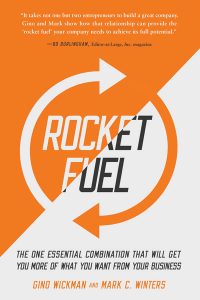
Rocket Fuel: The One Essential Combination That Will Get You More of What You Want from Your Business
I have one assistant. She directly works under Aaron and me. She’s our go-to. She’s amazing. She handles everybody. We have two virtual lead managers. They’ll handle all the incoming leads, and filter the ones that are nonsense and the rest of them. We have two acquisition managers. Those ones are here in California. One’s in San Diego and one’s up in Northern California. He’s technically virtual. We have a dispo manager that sells the contracts once we get them under contract.
The acquisition managers, what do they do? They take the leads and they’re the ones that do the actual acquisition. Is that true?
They get it to a contract. We have around 40 to 50 leads coming in a day from all our avenues of marketing. A lot of them are just, “You called me. Give me an offer.” Our lead managers filter through those 40 to 50, find the ones that are serious about selling and pass them to our acquisition team. The acquisition team will dig deeper. They go over numbers, go through the condition, and then get it to send out a contract.
What are the different marketing avenues that you use? I know that you started with driving for dollars, but that’s not what you’re doing anymore. Is that true? What kinds of marketing stuff do you do?
A lot of what we do is pull lists. We still market to our driving for dollars. It’s on a much smaller scale now. We pull retired landlord lists, the notice of default, and tax delinquent. The three marketing channels we’re big on right now are cold-calling, texting, and direct mail. Also, a little bit of PPC, but that is a beast in and of itself.
What is PPC?
It’s Pay-Per-Click. It’s Google Ads.
I feel like we could just keep talking forever, but we can’t. What I see in you is this well-oiled machine. I love seeing that you’ve taken it from you were doing all this work to now you’ve got these systems and they help you to drive a really good business that’s helping people. Ladies, just so you know, one of the things that Miquella has offered is to talk about that onboarding system that she uses. It’s based on a particular website with a portal so that she can do all of this onboarding.
She can hand this over to her cold-calling manager that’s going to do the hiring. It’s a system. She’s going to be talking about that in EXTRA. I’m super excited to learn more about that. Ladies, stay tuned for EXTRA for that. Before we move into our three Rapid-fire questions, could you tell us a little bit about how people can get in touch with you?
I’m on Facebook and Instagram. My Facebook is Miquella Gaunt. On Instagram, the same thing, @MiquellaGaunt. Feel free to direct message me on any of those platforms. LinkedIn, I’m on there, but not really.
I know you were going to offer some free time with you. Ladies, this is interesting. Miquella doesn’t coach, but when she does take her time out of her schedule, you can see that she and Aaron make quite a lot of money. Their time is worth a lot. She normally will charge for phone calls to help coach people or get them started or whatever, but she did offer for the first five of you to call her and connect with her on Instagram. Mention that you came from the show and that you heard her on this show and then she’ll give you an hour of free conversation, which is incredibly generous. Thank you for that.
It’s a super tip to get started in anything, but be obsessed with it, take notice, and take imperfect action. Share on XWe literally were talking about this on our honeymoon.
I’ve got opinions about that. I’m not going to share that with you, but it’s still funny. This is one of the things. It’s like the blessing and the curse of working with your spouse. It’s hard to get away. It’s also necessary for the relationship to get away. There is all of that stuff. It sounds like you and Aaron are balancing that beautiful.
We’re similar but opposite enough.
Miquella was saying that she is the implementer and he’s more of a visionary. That’s a beautiful matchup.
I was telling you that in the book Rocket Fuel, when we read that, we were like, “This is why companies work because they need a visionary and integrator,” and I was like, “That’s why our marriage works.”
Miquella, you were going to offer a free trial for PropStream also. Could you tell people what that is? What is PropStream? Why is it valuable?
PropStream is your access to property information without having MLS or real estate-based sites that you can see listings on. It helps you be able to do comps and pull property information for different properties as far as who the owners are or if they have anything owed against the property. You can also use PropStream to pull lists. That’s where we have been pulling our lists from. They have a lot of great different filters down to the age of home, if it was bought in cash or under a mortgage. You can fine-tune in there if list pointing something you’re looking for. You can comp properties on there. It has a lot of that information. For the people that don’t have their license, that doesn’t have access to the multiple listing service, that’s your replacement for that.
That’s called PropStream. There’s a whole range of what you can sign up for PropStream. There is the just getting a list and then there’s, “I can get comps and everything.” There’s a whole range of things. I’m not sure exactly what you get for free, but it’s worth checking it out. I hear about PropStream from all the pros. I’m excited that you’re offering this free trial. Ladies, if you want to get that, go to BlissfulInvestor.com/PropStream. Check that out. Thank you for that, Miquella.
Anything we can do to give back.
Thank you so much for that. Ladies, you know that Miquella is a student and friend of Zack Boothe, who we’ve had before. If you’re excited about learning what she learned from him, you can still connect with him and his team. Go to BlissfulInvestor.com/Zack. You’ll get to talk to him or Stephanie, who you have already met. They do have someone else working on the phones, too. I trust that that person would be as fabulous as them. You can go to that link and set up a time to chat with them, and see if this business is a good fit for you. We saw what an amazing fit it’s been for Miquella. We’ve heard from Zack a few times. Here are our three rapid-fire questions. Give us one super tip on getting started investing in real estate.
I think it’s a super tip on getting started in anything. It’s to be obsessed with it and take imperfect action. You’re not always going to have the answer or know what the outcome’s going to be, but just do it. You’ll figure it out along the way. You may stumble and fall, but it’s better than not having done anything. It’s analysis paralysis. Many people get stuck in analysis paralysis. Stop over-analyzing it. Just do it.

Virtual Team: You’re not always going to have the answer or know what the outcome’s going to be, but just do it and figure it out along the way. You may stumble or fall, but it’s better than not having done anything.
What is one strategy to be successful as a real estate investor?
Systems, processes, and document everything. You don’t want to be doing everything yourself. We’re all about reading books. Another good book is Who Not How. Can you do it? Yes, sure, but isn’t that the best use of your time? The only way that you can hire something like that out is by documenting how you do something. The simplest way, you don’t have to write it. If you don’t know how to write an SOP or a standard operating procedure, log in to Zoom, record yourself, share your screen, and then go through what you’re doing. That way, when you have to explain it to somebody, it’s there. You can reshare the video instead of having to re-explain and retrain over and over again.
What is one daily practice that you do that you would say contributes to your personal success?
I do try to get some kind of exercise daily as best as I can. We’re up at 5:00, especially up before the little one because working out with her is not possible. She tries to help. She’s so cute. She’ll come down, try to hold the way and count for me, but then she gets bored and then wants to play. Even if it’s going on a treadmill, getting your body moving does clear your mind. When you do start your day, go at it with purpose.
My thing is lists. On my phone, I have a notepad on there a to-do list. Every time I think of something, I jot it down, “I need to do this one.” You don’t forget it and feel like, “What was I thinking?” You are feeling overwhelmed. We come to the office for six hours and it’s just work. It’s not an eight-hour day where I got a break here and then I take lunch. I’m literally at that computer for six hours nonstop going as hard as possible getting it all done for as much as I can.
Thank you for that. Miquella, this has been amazing. Thanks for all you shared at this portion of the show.
I’m more than happy to. If anybody takes anything from it, it makes me happy because I know there are probably questions out there. Some people may not know where to start. If I could even help start somebody’s drive and passion or anything, that is something that I try to do.
You’ve been so generous. Thank you. Ladies, we’ve got more. She’s going to generously share with us her onboarding system in the portal that she uses and how she puts that together for the entire virtual team. Nobody’s ever done this before so I’m super excited. If you are subscribed to EXTRA, stay tuned. There’s more. If you’re not, go to RealEstateInvestingForWomenExtra.com. You get the first seven days for free. You could download this episode and as many others as you like and stay or not. It’s totally up to you. For those of you that are leaving right now, thank you so much for joining us for this portion of the show. I look forward to seeing you next time. Until then, remember, goals without action are just dreams. Get up there, take action, and create the life your heart deeply desires. I’ll see you soon. Bye.
Important Links
- Miquella Gaunt
- Rocket Fuel
- Rich Dad Poor Dad
- Driving For Dollars
- Upwork
- Mojo Dialer
- Miquella Gaunt – Facebook
- @MiquellaGaunt – Instagram
- BlissfulInvestor.com/PropStream
- Zack Boothe – Past Episode
- Stephanie Holleman – Past Episode
- BlissfulInvestor.com/Zack
- Who Not How
- RealEstateInvestingForWomenExtra.com
To listen to the EXTRA portion of this show go to RealEstateInvestingForWomenExtra.com
——————————————————
Learn how to create a consistent income stream by only working 5 hours a month the Blissful Investor Way.
Grab my FREE guide at http://www.BlissfulInvestor.com
Moneeka Sawyer is often described as one of the most blissful people you will ever meet. She has been investing in Real Estate for over 20 years, so has been through all the different cycles of the market. Still, she has turned $10,000 into over $5,000,000, working only 5-10 hours per MONTH with very little stress.
While building her multi-million dollar business, she has traveled to over 55 countries, dances every single day, supports causes that are important to her, and spends lots of time with her husband of over 20 years.
She is the international best-selling author of the multiple award-winning books “Choose Bliss: The Power and Practice of Joy and Contentment” and “Real Estate Investing for Women: Expert Conversations to Increase Wealth and Happiness the Blissful Way.”
Moneeka has been featured on stages including Carnegie Hall and Nasdaq, radio, podcasts such as Achieve Your Goals with Hal Elrod, and TV stations including ABC, CBS, FOX, and the CW, impacting over 150 million people.
Creating Passive Cash Flow With Non-Performing Notes With Paige Panzarello – Real Estate Women
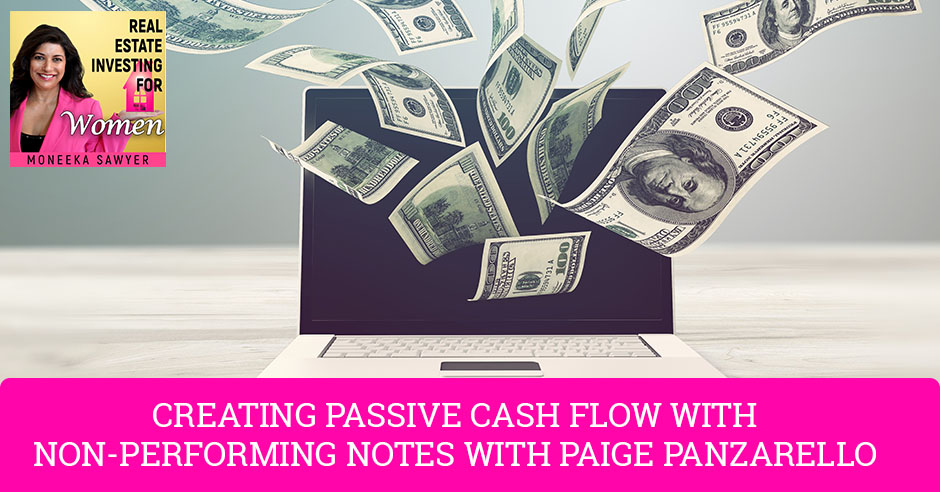
Can you imagine what it’s like $20 million dollars just when you’re starting to perform well in real estate? Paige Panzarello went through this ordeal in 2007, and it almost ended her real estate career. But now she’s bouncing back and she’s doing well with passive cash flow. And she’s doing it with non-performing notes! Listen to this episode as Paige tells it all to Moneeka Sawyer.
—
Watch the episode here
Listen to the podcast here
Creating Passive Cash Flow With Non-Performing Notes With Paige Panzarello – Real Estate Women
Real Estate Investing For Women
I am so excited to welcome to our show, Paige Panzarello. Having been a real estate investor and entrepreneur for many years, Paige has experienced many facets of real estate investing. Her experience includes founding and running her own residential and commercial construction and acquisition company.
She does buy and hold residential and commercial real estate investing, tax deeds and liens investing, and fix and flip residential remodeling and other forms, to name a few. She focuses on non-performing notes that she purchases all across the United States. Whether in residential or commercial real estate in California, Arizona or nationwide, Paige has been successful in completing over $150 million in real estate transactions to date. Welcome to the show, Paige. How are you?
Thank you so much for having me on. I’m so excited to be here.
Let’s start with your story. Tell us where you have been.
I have been a real estate investor for many years. I started my real estate investing career a little differently than most people. I literally was thrown into the deep end of the pool by virtue of inheritance. I knew nothing about real estate investing or real estate, much less investing. My grandmother passed away.
She had a rather sizable estate, half of which was in California and half of which was in Arizona. Off I went at a very young age to Arizona, knowing nothing about real estate or real estate investing. We had 38 townhome units that were only about 40% occupied. We had a sewer treatment plant and some land. I knew nothing about anything. Unfortunately, the estate was about $4 million in debt.
I was thrown into the deep end of the pool and learned quickly that all I had to do was ask questions and surround myself with people that had the answers. I was good at that and doing what I said I was going to do. If I said I was going to do something and asked the people that we owed money, I asked them to work with me, and they did. The flip side is that I was able to do what I said I was going to do. I quickly built a reputation, a good one, which was paramount.
I was able in three years to turn the properties around. We brought it back into the black in about three years. We were in a boutique market in Arizona, and I realized that we weren’t going to be able to sustain profitability. I went to my family and said, “I want to build on the land, sell the units and the sewer treatment plant.” They were all for selling the sewer treatment plant, by the way. I wanted to leverage that and go into building the land.
My family said, “I don’t want any part of that.” I said, “I want to buy the company, which I did.” I started to develop the land and hired a contractor. I realized very quickly that he was going to bankrupt me before I was even coming out of the ground. I fired him and found somebody else that would be my qualifying party. I started a construction company knowing nothing about construction. I set the pace to put us on the fast track. We were rocking and rolling. In three years’ time, we had 36 employees. We held all our licenses except HVAC and roofing.
The reason that we didn’t have those is that the insurance was way too high. We were building our own projects, everybody else’s projects, and it was great. Except that, even at that young age, I was exhausted and working myself 18 hours a day, 7 days a week, into an early grave. I was making money hand over fist. I had a lot of assets and liquidity. I thought I was having a good time, and 2007 happened.
Even if you know nothing about real estate, you can still pursue a business within the industry. Share on XThe funny thing is I saw it coming but I was naive in the fact that I thought, “This is not going to happen to me because I’m only leveraged about 10%.” I was wrong. It happened right on top of my head. Everybody that owed me money, their funding froze up. I was in the unique position that I did not have to go through bankruptcy to discharge the debts that I owed. I sold off everything that I owned. I had liquidity and cash. It took me about three years but I paid everybody off. I had a fire sale, everything. At the end of the day, I lost $20 million.
I walked away with my head held high, which was important to me. I still have investors that I work with now because of that. I wanted to make everybody else hold. That was important to me. I walked away from real estate investing for a little while, but I came back like everybody else. I had to rebuild. I didn’t have the money to put it together but I did have a good brain for real estate. I love it. I have a passion for it and a passion for helping people. I went the same route that everybody goes, wholesaling, fixing, and flipping. Some buy and hold as you grow, tax liens, and tax deeds.
I was also looking into and studying non-performing notes. About a year after I started studying it, I bought my first one. Angels sang for me. When you lose $20 million, that has a tendency to shape you as an investor. I know all of my risk tolerance. I know exactly where I’m going. When I landed in the note space, I was ecstatic because it has everything I possibly want as an investor. I never looked back.
Tell me a little bit about notes.
Notes basically are your promise to pay. There’s a variety of different kinds of notes that you can buy. I focus on the first position, meaning I’m the first one to get paid. First position non-performing notes that are secured by residential real estate. You can buy notes that are against cars. You can buy notes that are credit card debt. All those things are promises to pay.
When you finance anything, that’s your promise to pay. That’s a note. I focus on the non-performing space as opposed to the performing space. The performing space is the borrower paying their monthly payment. The non-performing space is where the borrower has stopped paying their monthly payments. My notes again are secured by residential real estate.
Why would you do non-performing?
I get that a lot, “Why on Earth would you buy a non-performing note when someone stopped paying?” The answer is there’s a variety of different reasons but the biggest one is that we would get a big discount. When you buy something at a steep discount, you build in a cushion of equity. That gives you power and control where you can mitigate your risk. After 2007, I was all about power, control, and mitigating risk.

Passive Cash Flow: Ask questions and surround yourself with people who have the answers.
As an investor, can you make money with non-performing notes? How does that work?
When we buy a non-performing note, there is a face value of the note. The Unpaid Principal Balance is also called the UPB. Let’s say that’s $100,000, but the market value of the property is only $80,000. That note is underwater. Those borrowers are underwater. When I buy a note, I buy it based on the current market value of the securing collateral, also known as the house. It’s $80,000, and I will buy it at a deep discount from there. It used to be we were able to buy notes anywhere between 40% and 50%, sometimes even a little less. Now it’s hovering around 55% to 60%, still quite a nice size equity cushion.
For that same $80,000 house, I’m spending $45,000 for the note. They will buy and build in a huge equity cushion. The borrower still owes me $100,000 because the unpaid principal balance is $100,000. I have a lot of flexibility and maneuverability to work with that borrower to either get them to reperform and start paying on their mortgage or sometimes our borrowers will give us what’s called a deed in lieu of foreclosure. They don’t want the house anymore but don’t want the foreclosure on their record.
They will deed us the property as payment in full. I can turn around and sell that house for $80,000 because that’s the market value of the property. That’s how I make money as a note investor in buying non-performing notes. The best part, though, is if we get it to reperform, not only am I generating chunks of cash. I’m also generating streams of monthly cashflow. I’m creating two different avenues of money coming into my pocket in the same vehicle, which is tremendous as far as I’m concerned.
Tell me a little bit more about that. How does that work?
In terms of the reperformance or the exit strategies because we have 23 different exit strategies in note investing. Remember, I’m risk-averse. With 23 different exit strategies that are avail, we are able to mitigate that risk. Were you asking about the reperforming situation and how we generate chunks and streams of cash?
Yes.
Getting a borrower to reperform is my favorite exit strategy that we use. It happens about a third of the time. We generally only use four main exit strategies but we still have 23 at our avail. Everybody knows about foreclosure. That’s one of our exit strategies. Sometimes, we have two. Short sale, everybody knows what a short sale is. It’s $100,000, and the borrower comes to us and says, “I have somebody that’s willing to buy it for $80,000. Will you accept it?” How fast do you think I’m going to say yes?
When you say something you need to do, just do it. Share on XDeed in lieu of foreclosure, I’ve already explained. The reperforming situation is my favorite. The borrower comes to us through our loss mitigation team. This is something I understand that I have a team in place. I have direct contact with our borrowers because I’ve got a very big heart, and everybody has got a story. I am not a licensed debt collector. The team that I pay is licensed, debt collectors.
They know all the CFPB rules and regulations. It’s well worth the small fee that I pay them per asset, per month, to deal directly with our borrowers. They are the liaison. Through our team, we talk with our borrowers and let us know that they want to stay. Let’s say that the same unpaid principal balance is $100,000, the house is only worth $80,000, and they haven’t paid for 2 or 3 years.
We get a lot of these that haven’t paid 2, 3, 4, even sometimes longer. They now owe us another $20,000 between arrearage, and maybe we have fronted some property taxes, so we don’t lose our collateral that’s securing our invested dollars. Let’s say the total amount due, the total legal balance is $120,000 but the house is only worth $80,000. There’s $40,000 on the hole.
They say they want to stay, had a medical condition, whatever, but now, they can pay. We are in a position where we can go to that borrower, and eventually, we do this through what’s called a forbearance agreement. We don’t do a permanent loan modification immediately. The borrower hasn’t paid for a while. They have to have a little skin in the game.
We will say to them, “We are going to require a reinstatement fee.” It’s usually somewhere around $2,500 to $5,000, depending. Believe me, when people want to stay in their homes, they figure out a way to come up with that money. There’s that chunk of cash. We will say to them, “We will put on hold the $40,000 that is underwater.”
We will do the forbearance agreement and a trial payment plan. You pay your reinstatement fee. We can do so many different things. We can lower interest rates and payments. We can create a new amortization schedule. We can stretch out their payments and make their payments lower. We can forgive some of the principal balance.
We will work out a payment plan that works for that borrower that works for us in terms of our numbers as well. If they pay for the first 4 to 6 months on time, every time, we will take half of that $40,000 and forgive it. If they pay on time, every time for the next 4 to 6 months, we will forgive the other half. At that point, we will put a permanent modification in place at $80,000, which is the market value of the property.
It is a more manageable mortgage for our borrower, at $80,000. We’ve created a chunk of cash at the beginning of this whole process. We’ve monthly cashflowed every single month. There are your streams of cash. At the end of the twelve months, we have a decision to make because we now have what’s called a season’s note.

Passive Cash Flow: When you buy something at a steep discount, you build in a cushion of equity and that gives you power and control where you can mitigate your risk.
There are plenty of note investors that are out there that like the performing notes because they like the monthly cashflow but they don’t want to be a landlord. They don’t want the tenants and toilets. They are willing to buy that performing seasoned note from us. We slightly discount it to another note investor. They are willing to buy that close to close to par, which is close to the $80,000. We will discount it a little bit and give them an equity cushion. You can see how that’s very profitable or we can hold onto it and keep cashflowing it. We do choose to do that as well.
That’s one of your exit strategies. I can totally see that you have a big heart. You want people to be able to keep their homes, and I feel the same way. It’s beautiful.
Especially after the 2007 crash, I have had life happen to me, and sometimes I have to take off my heart hat and put on my hard hat, and that’s never fun to do. My goal is to set out to help people. I’m in a position, by becoming the bank as a note investor, to do that for those that qualify, and not everybody qualifies but that’s a big thing for me.
You told us a little bit about your exit strategy, why don’t you walk us through the steps of acquiring a non-performing note?
Acquiring a non-performing note is very similar to any other type of real estate investing. There are two things that everybody looks for in real estate investing. One is deals, and the other is money. Note investing is no different. It’s about your network and networking. I like to think of investing as a more gentle form of real estate investing.
There is competition but it’s not nearly as fierce as the fix and flip market. You need to network. As everybody knows, your net worth is determined by your network. You need to get out there, start asking questions, start talking to people, go to REIA meetings, join BiggerPockets, and listen to podcasts. All those things are important to get you into the note space.
The interesting thing about the note space is at the asset managers. I used that word as an all-encompassing word. These are the people that handle portfolios for a variety of different sources, banks, hedge funds, other note investors, smaller commercial banks, community banks, credit unions, etc. The asset manager is the one that handles the portfolio and the disposition of the assets. Asset managers in the note space it’s very collaborative.
As you develop your relationship and your reputation with these asset managers, they will introduce you to other asset managers, which blew me away the first time that that happened to me. I thought, “Why on Earth would he do that?” You would think that there would be a lot more competition but there isn’t. That’s great too. If you do what you say you are going to do in the note space, and by the way, that is paramount, please do not waste these asset managers’ time. They do not like it, and you won’t get any more products. As long as you develop that relationship, they will help to catapult you to the next level.
You have to put action behind the desire. That's how you start. Share on XThat’s true with everybody, do what you say you are going to do. It’s also interesting how we don’t do what we say we are going to do for ourselves. There’s one thing about doing what you say you are going to do for other people but what about for yourself too? Part of building a blissful wealth empire is keeping your commitments to yourself, making yourself a priority and your promises a priority to yourself and others.
That’s such a hard thing for entrepreneurs because, as entrepreneurs, we put everybody else in front of us all the time, and it’s almost like we feel guilty if we take a spa day.
There are other ways. Yes, in the take care of yourself. That’s very important. The other thing is I’m committed to learning about real estate, and these are the steps that I’m going to take. Instead of putting off those steps, it’s to keep those promises. “Now I’m going to research notes or I’m going to send to this person to further that business.” Much of the timepieces of this can be intimidating.
It can be scary. They can feel overwhelming. Instead of keeping our promises, we procrastinate. That slowly chips away at our self-confidence. On all levels, whether it’s for your business, yourself or your family, keep your promises to yourself and the people around you. Tell me, what is the most rewarding part of investing in notes?
I get to create win-win situations for everybody. If I can help a borrower reperform and stay in their home, that is the most rewarding. We have had situations where we have had families and single moms that have a couple of kids that are going through a divorce. The big banks didn’t care. We came in and were able to help keep that family, that single mom, and her kids and their home. That is fulfilling and rewarding to me, more so than any amount of money. Having gone through and had life happen to me is the most rewarding part for me all day long.
Haven’t you loved hearing Paige talk about her notes investing strategy? Do you want to learn more from her? You can learn how to create real wealth with real estate-backed non-performing notes from June 10th to 12th. In Paige’s three-day, hands-on, interactive, virtual, and packed with information event, you will learn how to get started investing in notes so you can grow your nest egg, achieve your goals faster, retire early with peace of mind, create chunks of cash and streams of monthly cashflow. The options are endless, and you will be helping people stay in their homes.
Ladies in the green room before the show, Paige mentioned that this is the only event she’s offering this year. Don’t miss it. Otherwise, you will have to wait a long time to get this opportunity again. Take action now, so you can take advantage of this market. The opportunities in notes are staggering. See what all the buzz is about and reserve your seat now at BlissfulInvestor.com/notes. The virtual live event is from June 10th to 12th. Are you ready for three rapid-fire questions?
I am.

Passive Cash Flow: Just as long as you stand in integrity and you behave that way, people will be understanding because life does happen. Mistakes are made but don’t lie to people and don’t try and pull the wool over their eyes, just stand in your integrity, own up to it.
Tell us one super tip on getting started in real estate investing?
Take action. You can educate yourself to the cows come home but if you have analysis paralysis, you are never going to go anywhere. You got to put action behind the desire. That’s how you start.
What is one strategy for being successful in real estate investing?
This is a big one. To be successful, you have got to make the deal conform to you and who you are as an investor, not the other way around, do not ever conform to a deal. You set the guidelines, the outline, the bullet points, and what is your good risk tolerance and make the deal conform to you, do not conform to the deal.
What is one daily practice that you do that you would say contributes to your personal success?
I have integrity. We are all human. We all make mistakes. I don’t ever try and pull the wool over somebody’s eyes. If I make a mistake, I own up to it. People know when you are dealing with people and teams, money and emotions, there’s a big swirling around of all of that. As long as you stand in integrity and you behave that way, people will be understanding because life does happen. Mistakes are made, but don’t lie to people and don’t try and pull the wool over their eyes. Stand in your integrity, and own up to it. Believe me, and you will have more forgiveness and a better, stronger relationship if you behave that way. That’s how I conduct not only my business but my life.
Thank you so much for all of your words of wisdom for my audience. This show has been amazing.
Thank you for having me. I enjoyed it.
Don’t miss Paige’s upcoming three-day virtual live event from June 10th to 12th. It will be a long time before she’s going to be doing this again. Don’t miss it. Sign up now at BlissfulInvestor.com/notes. Thank you so much for joining Paige and me for this show. I look forward to seeing you next time. Until then, remember, goals without action are just streams. Get out there, take action and create the life your heart most deeply desires.
Important Links
About Paige Panzarello
 Paige Panzarello is the “Cashflow Chick”. Having been a Real Estate investor and entrepreneur for almost 25 years, Paige has experienced many facets of real estate investing. Her experience includes founding and running her own Residential and Commercial Construction and Acquisition companies, Buy and Hold residential and commercial real estate investing, Tax Deeds/Liens Investing, Fix and Flip (Residential Remodeling), and other forms to name a few. She currently focuses on Non-Performing Notes that she purchases all across the United States. Whether in notes, residential or commercial real estate, in California, Arizona, or nationwide, Paige has been successful in completing over $150 million in real estate transactions to date.
Paige Panzarello is the “Cashflow Chick”. Having been a Real Estate investor and entrepreneur for almost 25 years, Paige has experienced many facets of real estate investing. Her experience includes founding and running her own Residential and Commercial Construction and Acquisition companies, Buy and Hold residential and commercial real estate investing, Tax Deeds/Liens Investing, Fix and Flip (Residential Remodeling), and other forms to name a few. She currently focuses on Non-Performing Notes that she purchases all across the United States. Whether in notes, residential or commercial real estate, in California, Arizona, or nationwide, Paige has been successful in completing over $150 million in real estate transactions to date.
She has been a regularly featured guest on “The Cashflow Guys” podcast, and you can also find her on the “Best Ever Show” with Joe Fairless, “The Note Closers Show”, “Cashflow Ninja”, “Secrets to Real Estate Investing” and “Real Estate Investor Goddesses” podcasts, among many others. Paige has also been interviewed and highlighted in an article in the Wall Street Journal. She also speaks at various different Real Estate Investing clubs and conferences across the country.
Paige has been purchasing Non-Performing Notes (NPNs) since 2014, and she formed The Tryllion Group, which invests in Notes across the country.
Paige teaches the “Building Wealth with Notes” Workshop that drills down into the details of how to buy Non-Performing Notes, what to look for, due diligence to perform, and most importantly, how to mitigate risk. Her 10-week Master Class is a hands-on deep dive where Paige walks you through the nitty-gritty details to be a successful Note buyer.
Having experienced the hardship of the economic downturn of 2007, and what she calls “a very difficult learning experience”, Paige knows first-hand how “life can happen” to everyone. Her company was founded to help people in distress. Paige is also driven to help educate people on the importance of passive income, deal evaluation, money and debt management. She wants everyone to elevate their situation and become free of dependence on anyone or anything, so that when “life happens”, people will be ready, not broken.
Whether it is improving communities one house at a time, helping borrowers stay in their homes, or working with other investors to learn a new way to potentially earn higher returns for their investment dollars toward money cash flow or their retirement years, Paige is dedicated to helping people improve their lives in every way. She lives by the motto, “People first, profit second.”
______________________________________
To listen to the EXTRA portion of this show go to RealEstateInvestingForWomenExtra.com
To see this program in video:
Search on Roku for Real Estate Investing 4 Women or go to this link: https://blissfulinvestor.com/biroku
On YouTube go to Real Estate Investing for Women
Moneeka Sawyer is often described as one of the most blissful people you will ever meet. She has been investing in Real Estate for over 20 years, so has been through all the different cycles of the market. Still, she has turned $10,000 into over $5,000,000, working only 5-10 hours per MONTH with very little stress.
While building her multi-million dollar business, she has traveled to over 55 countries, dances every single day, supports causes that are important to her, and spends lots of time with her husband of over 20 years.
She is the international best-selling author of the multiple award-winning books “Choose Bliss: The Power and Practice of Joy and Contentment” and “Real Estate Investing for Women: Expert Conversations to Increase Wealth and Happiness the Blissful Way.”
Moneeka has been featured on stages including Carnegie Hall and Nasdaq, radio, podcasts such as Achieve Your Goals with Hal Elrod, and TV stations including ABC, CBS, FOX, and the CW, impacting over 150 million people.


